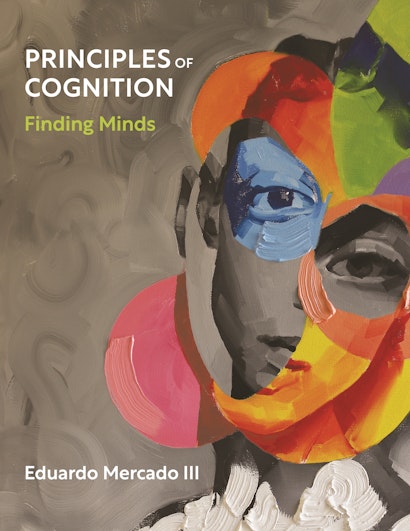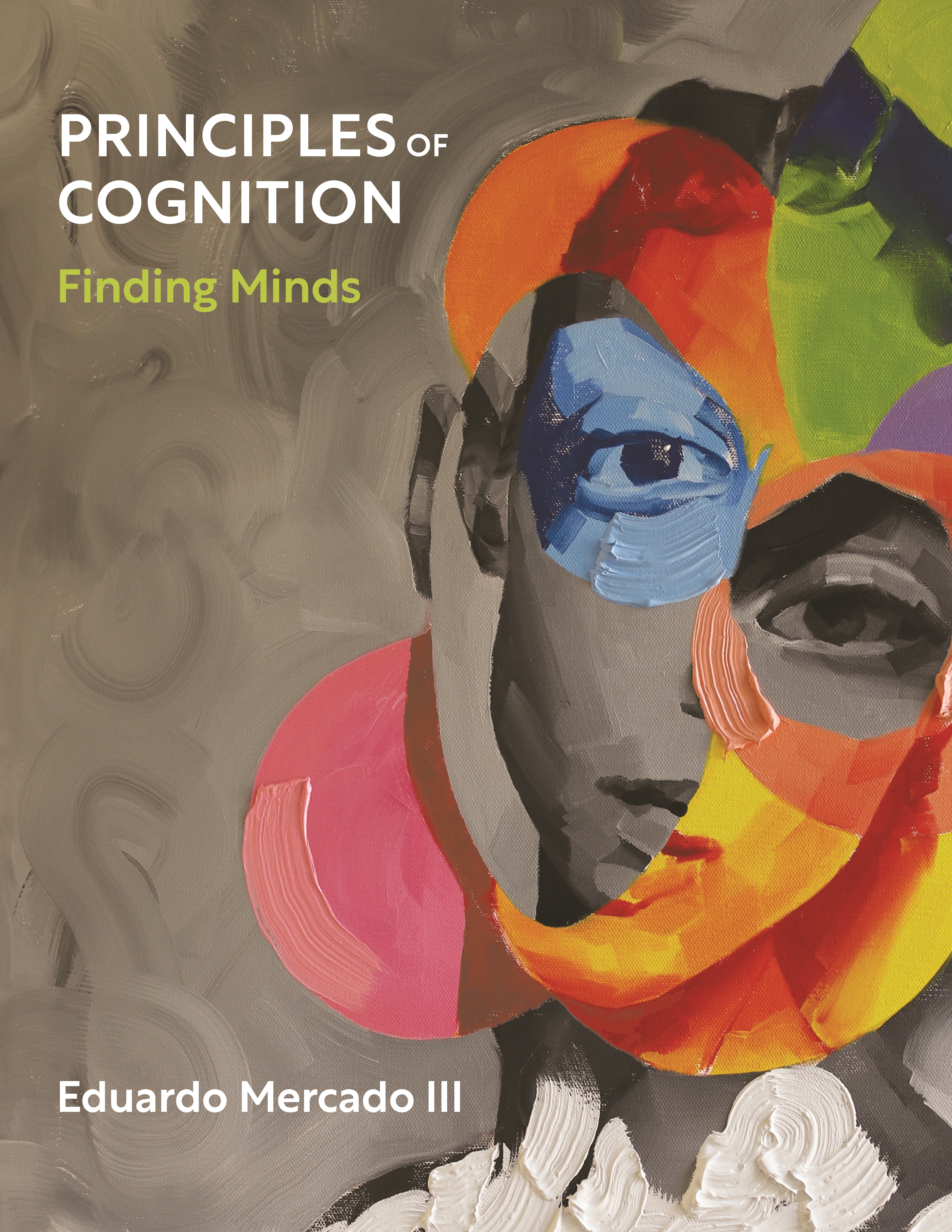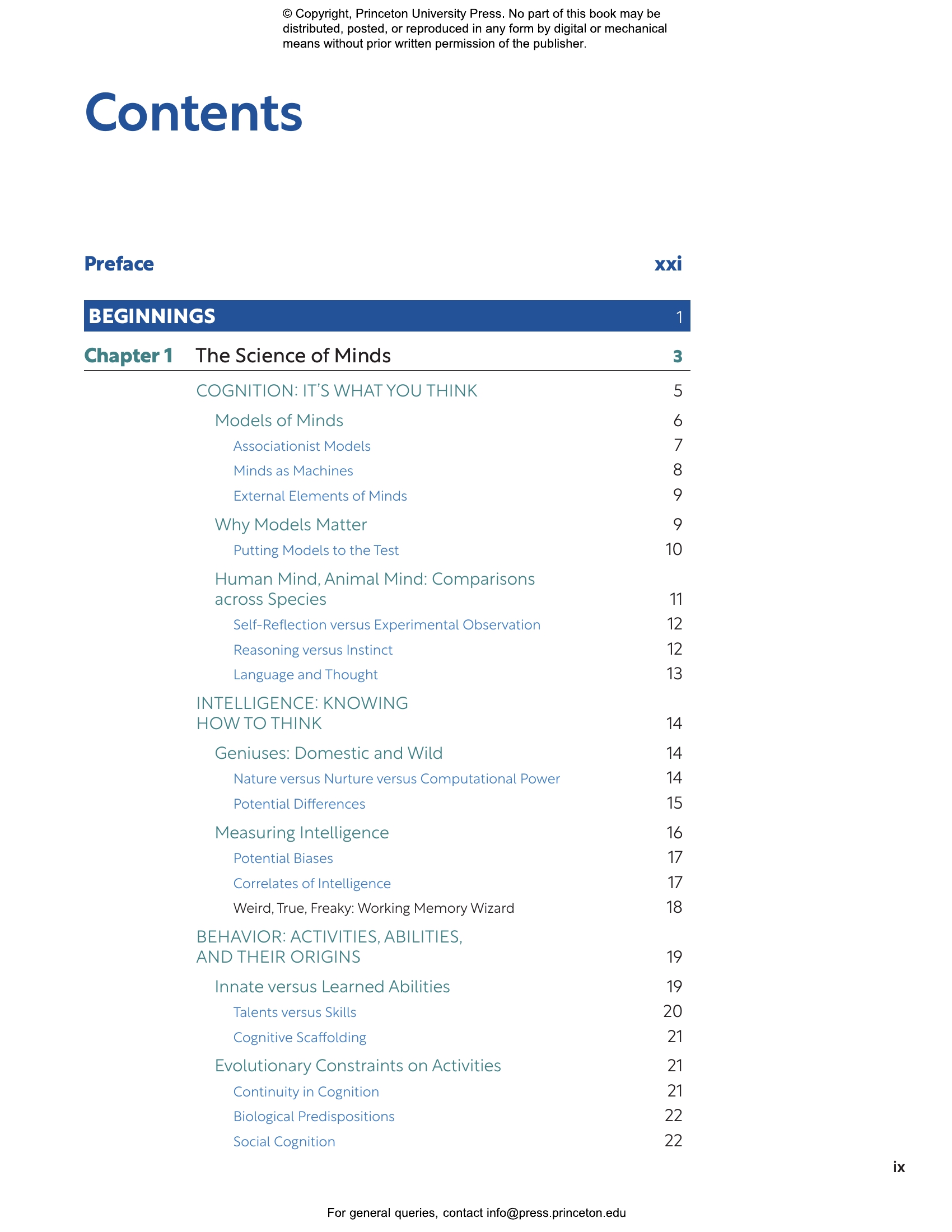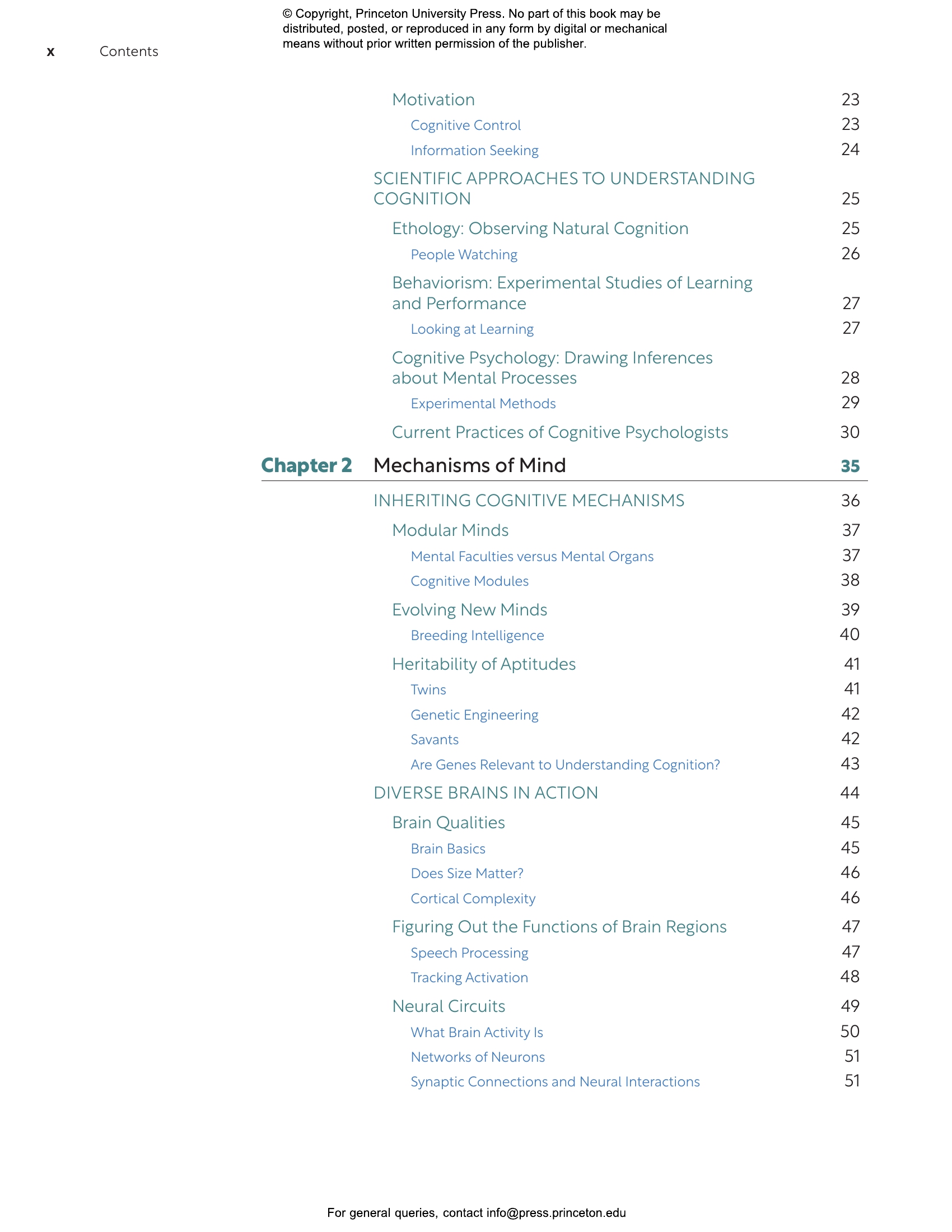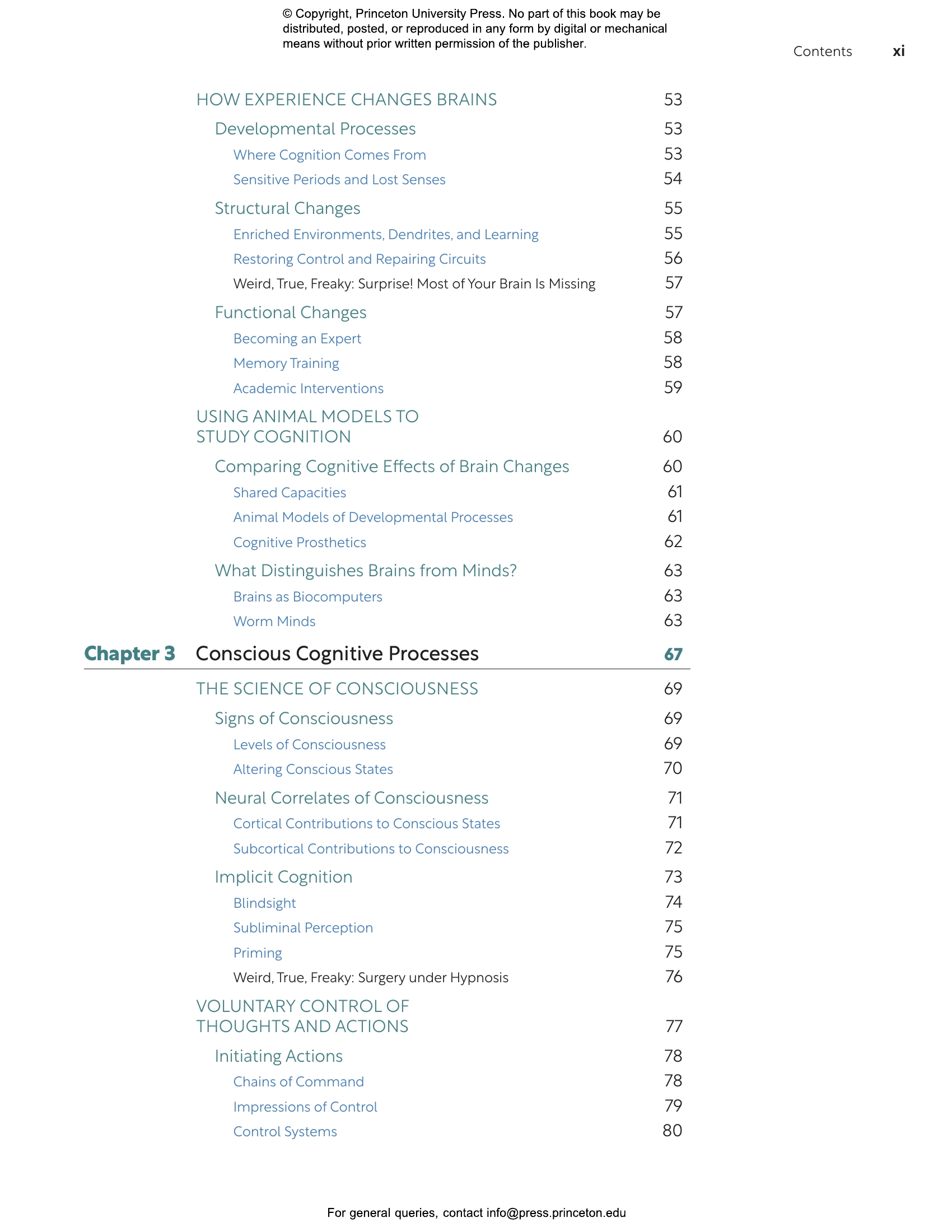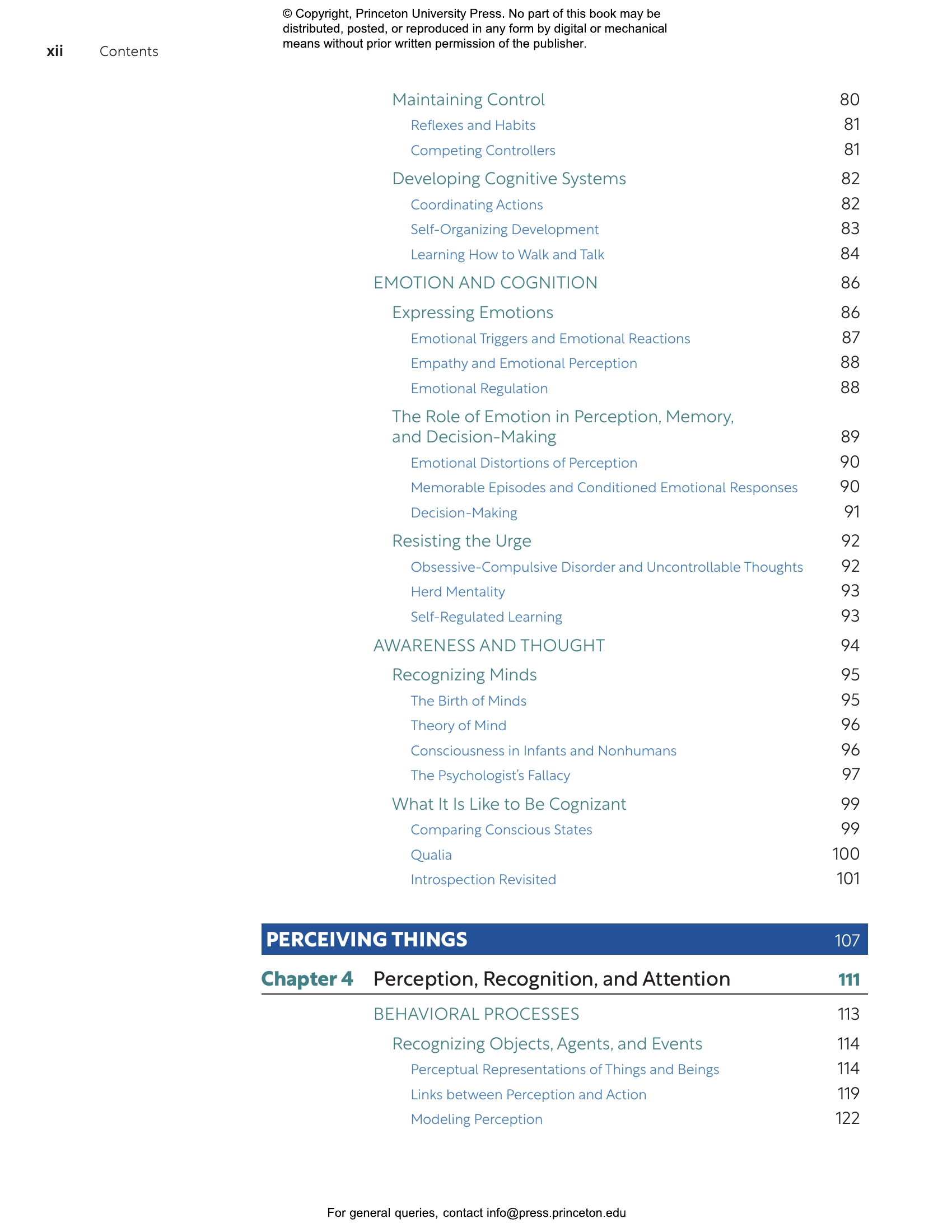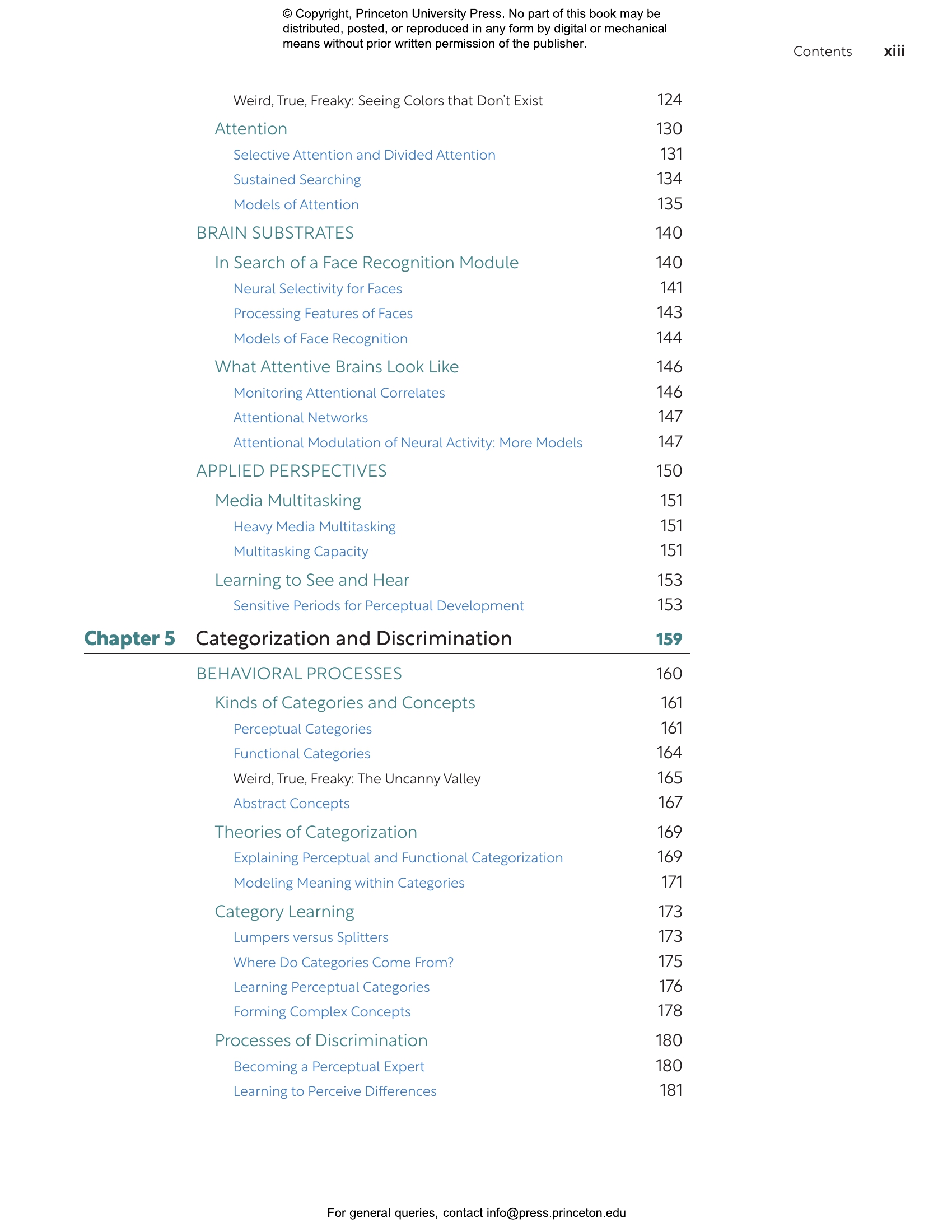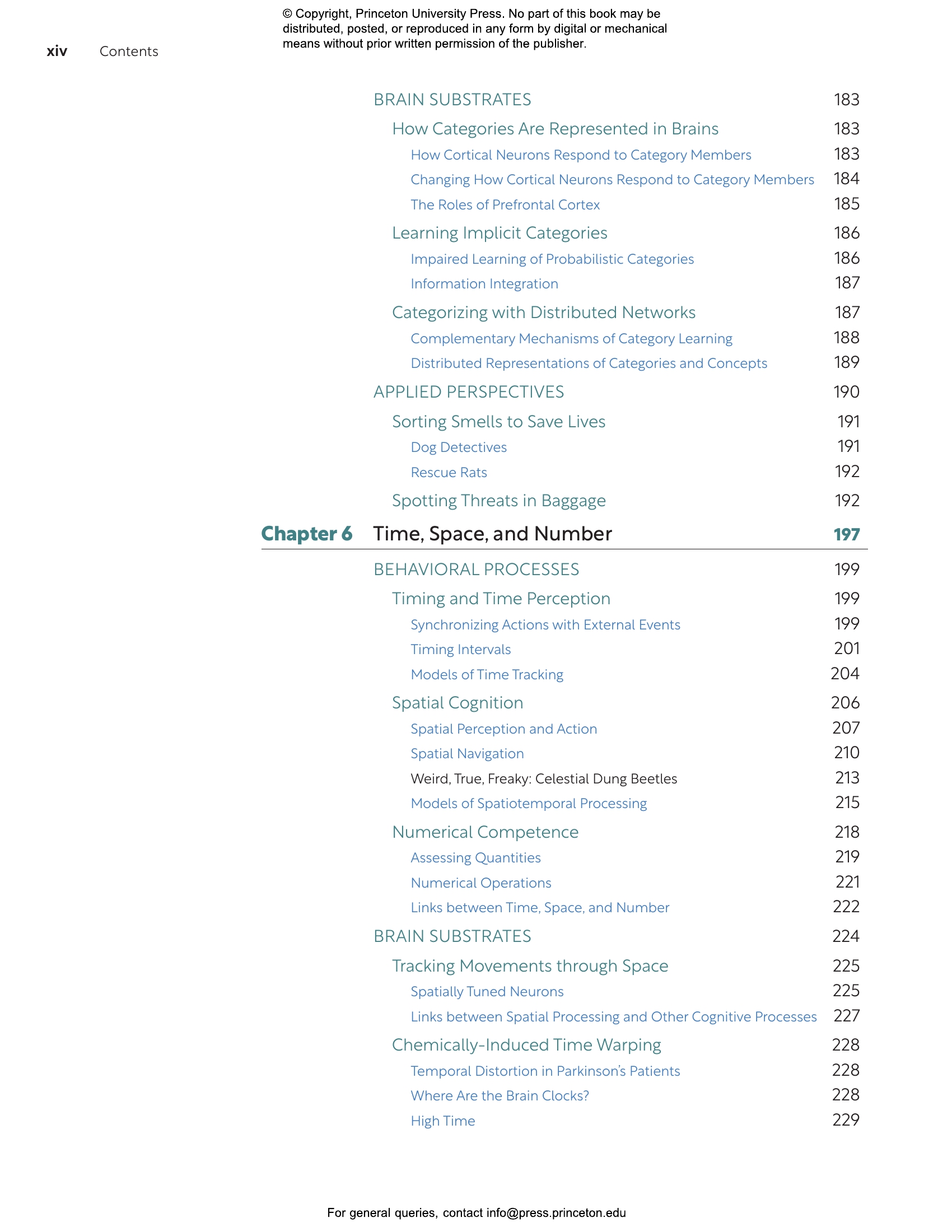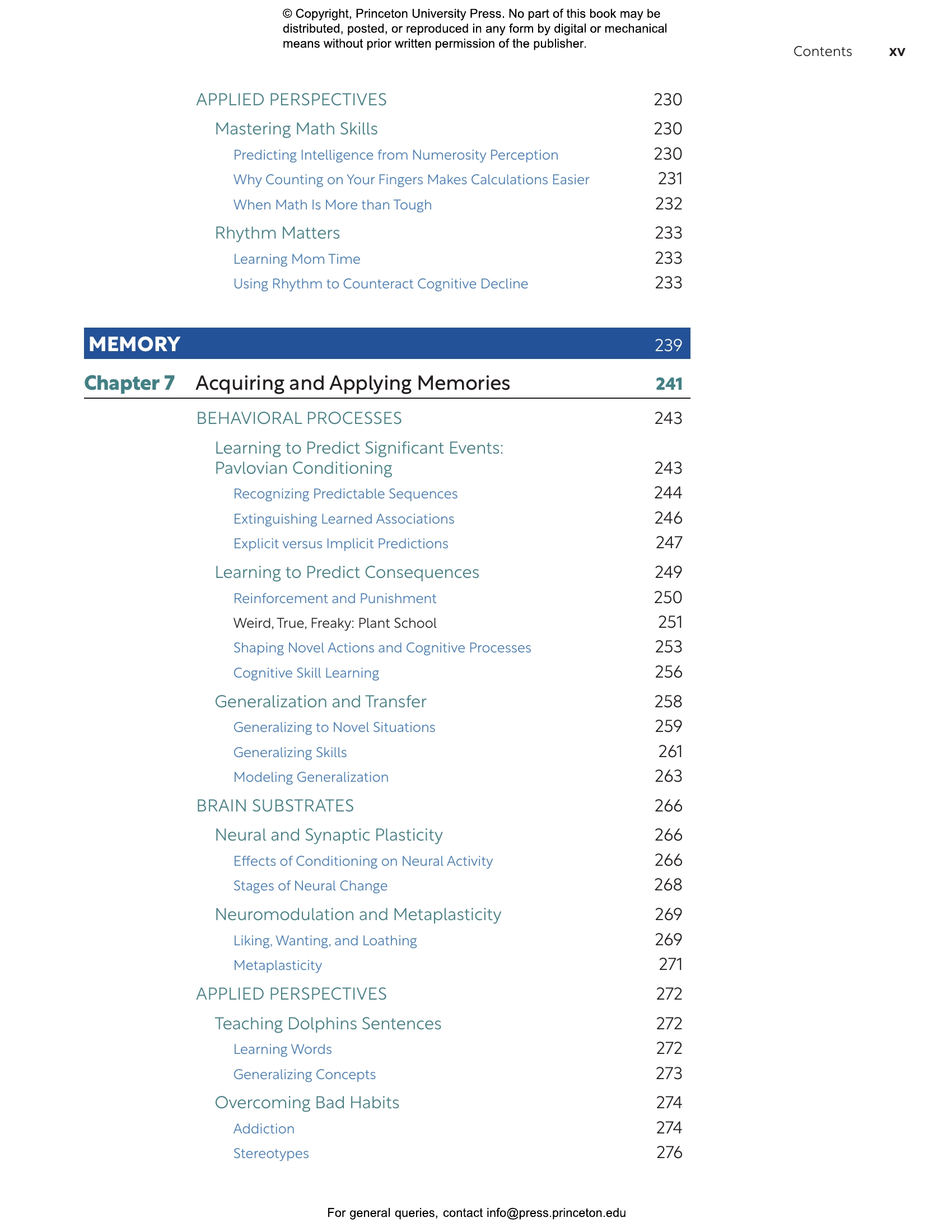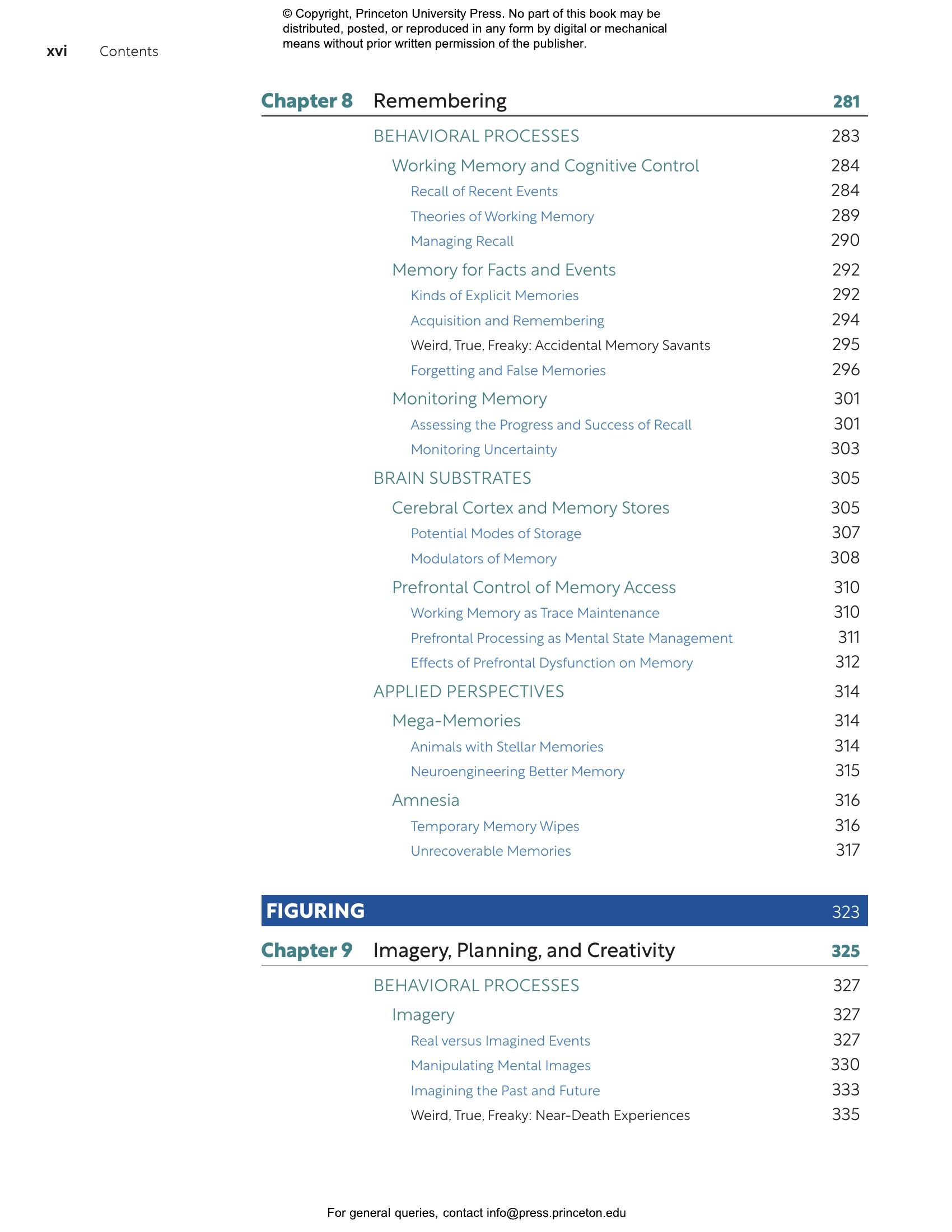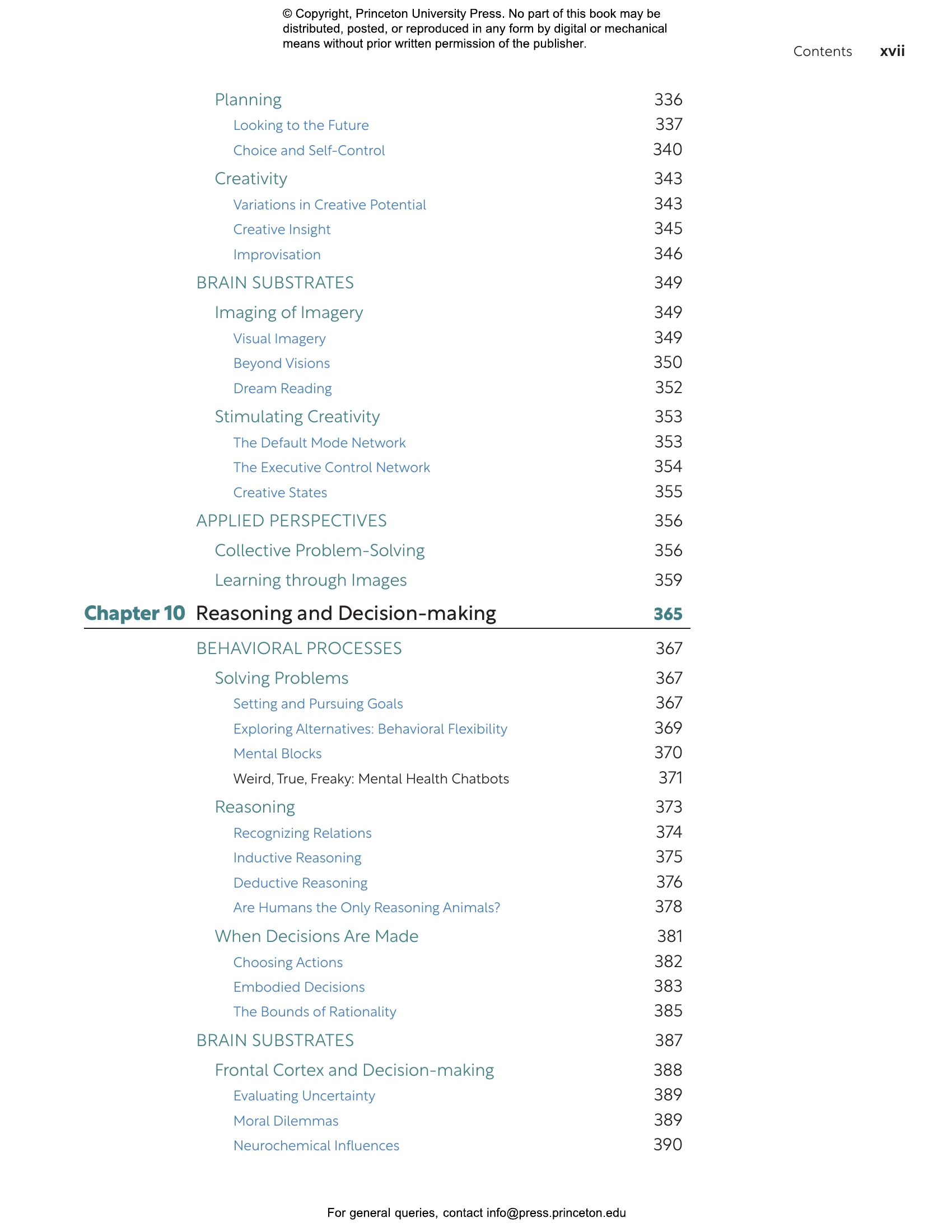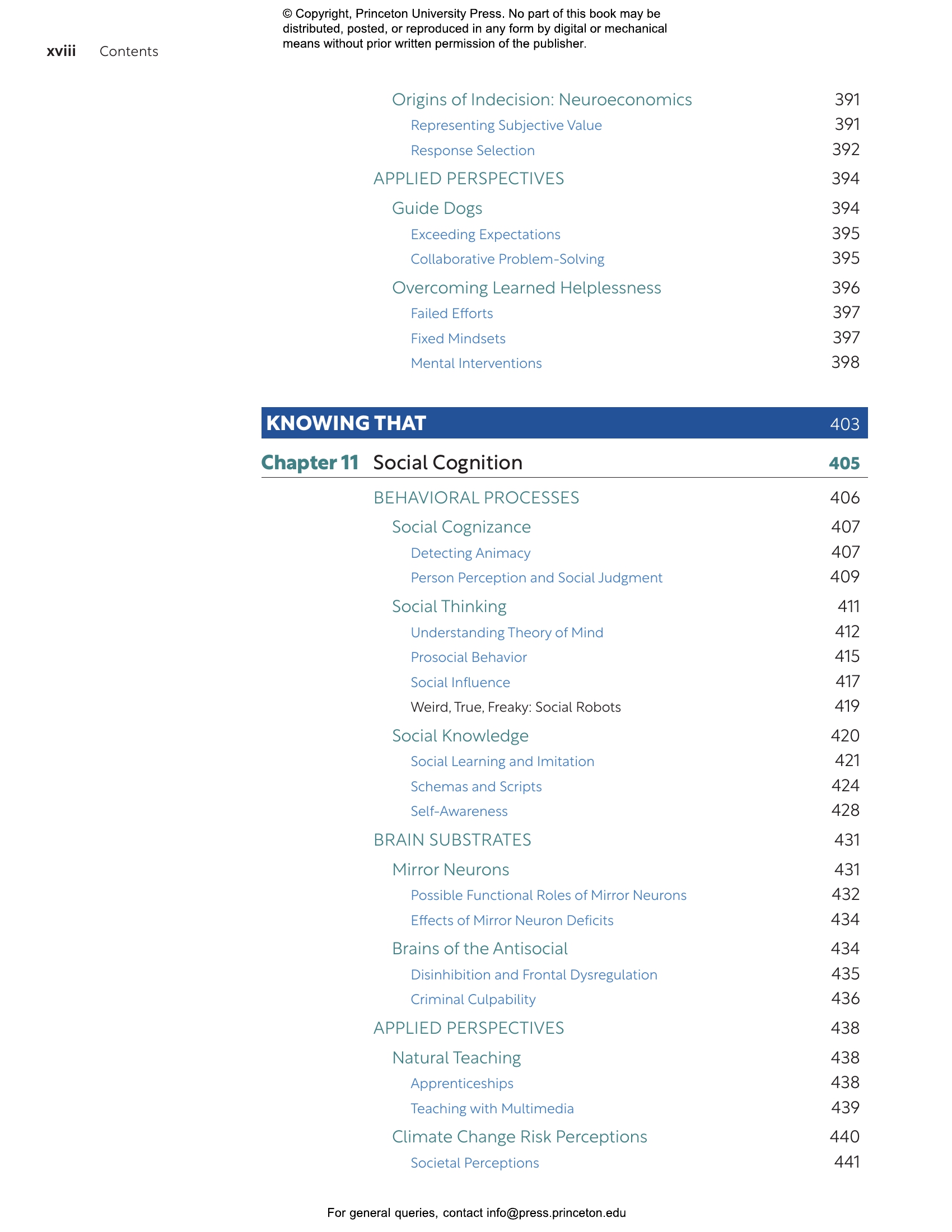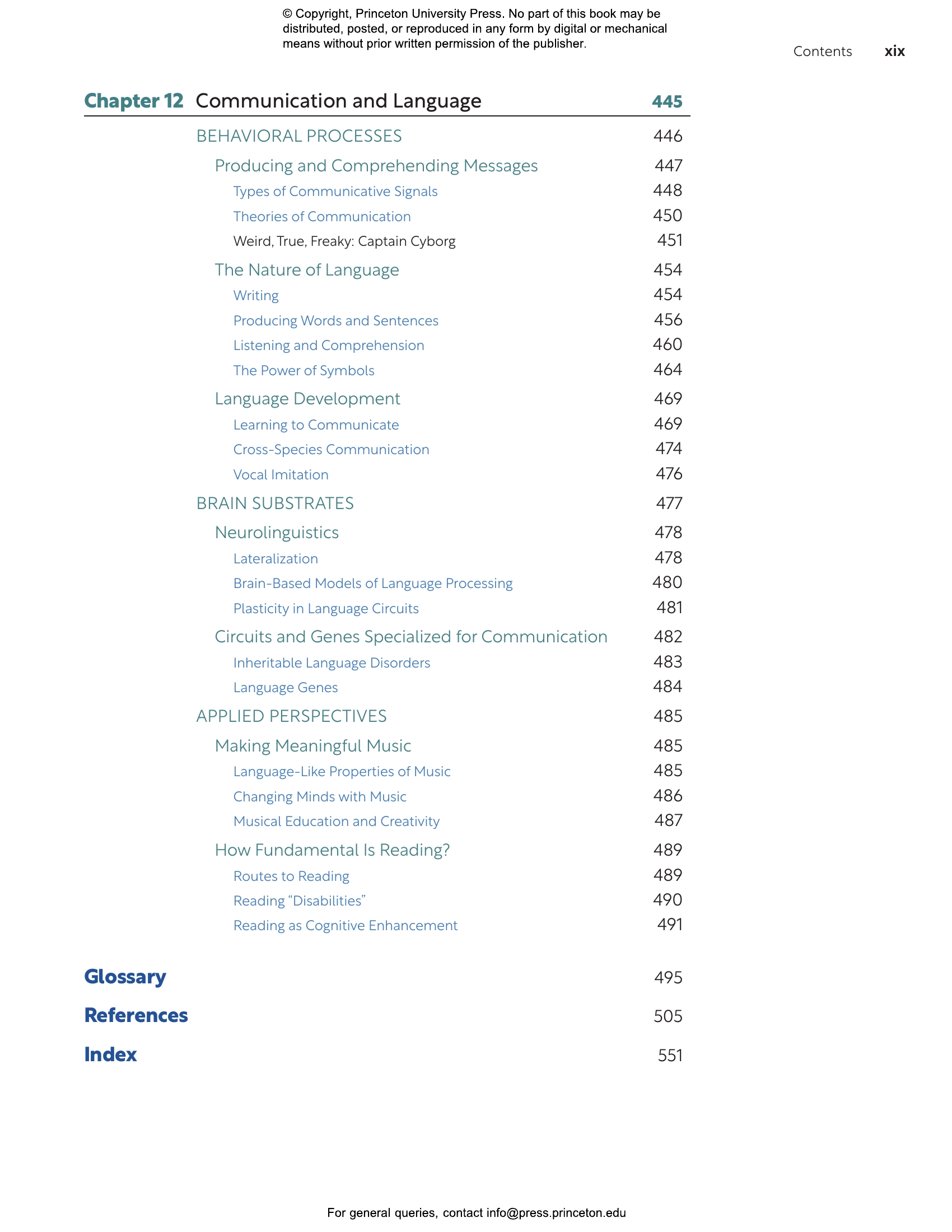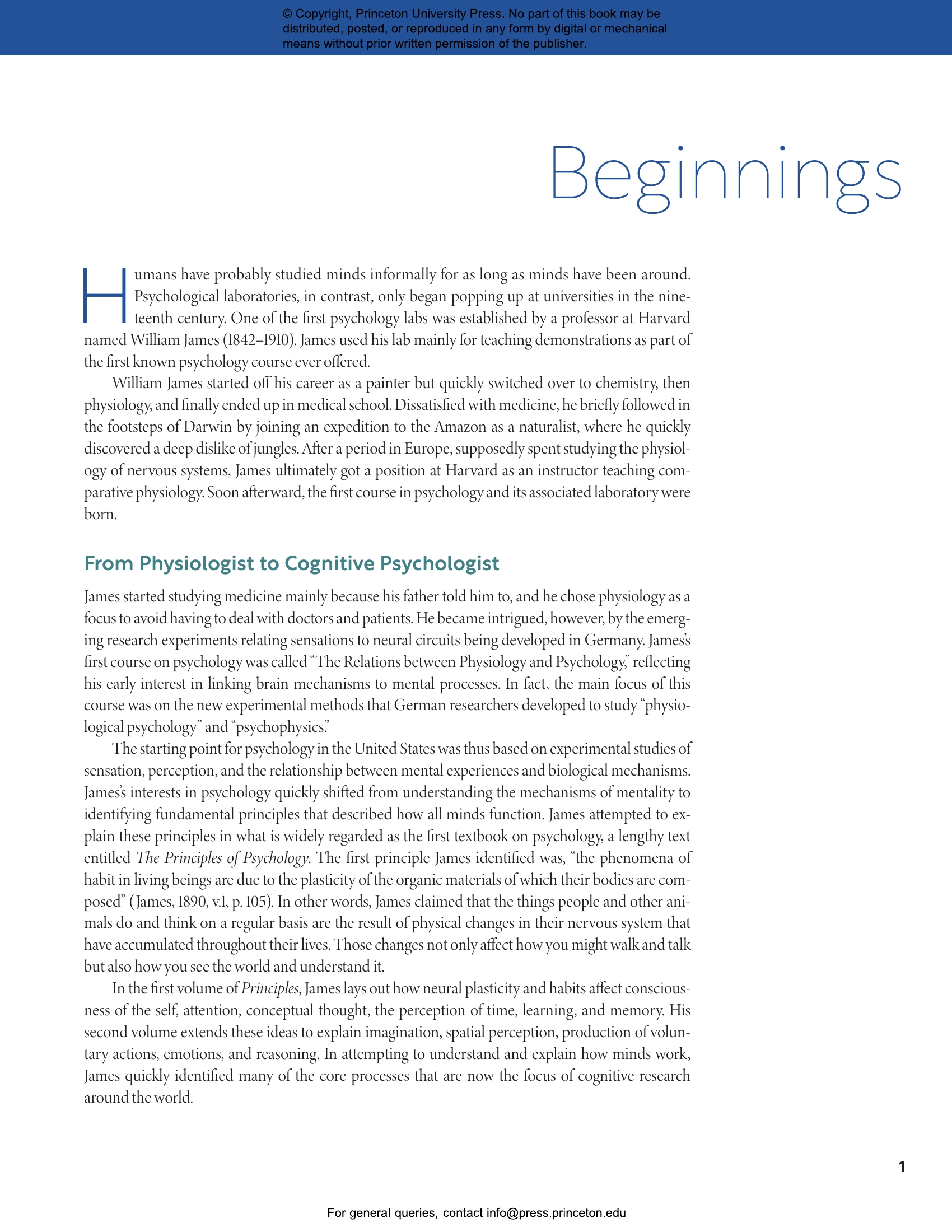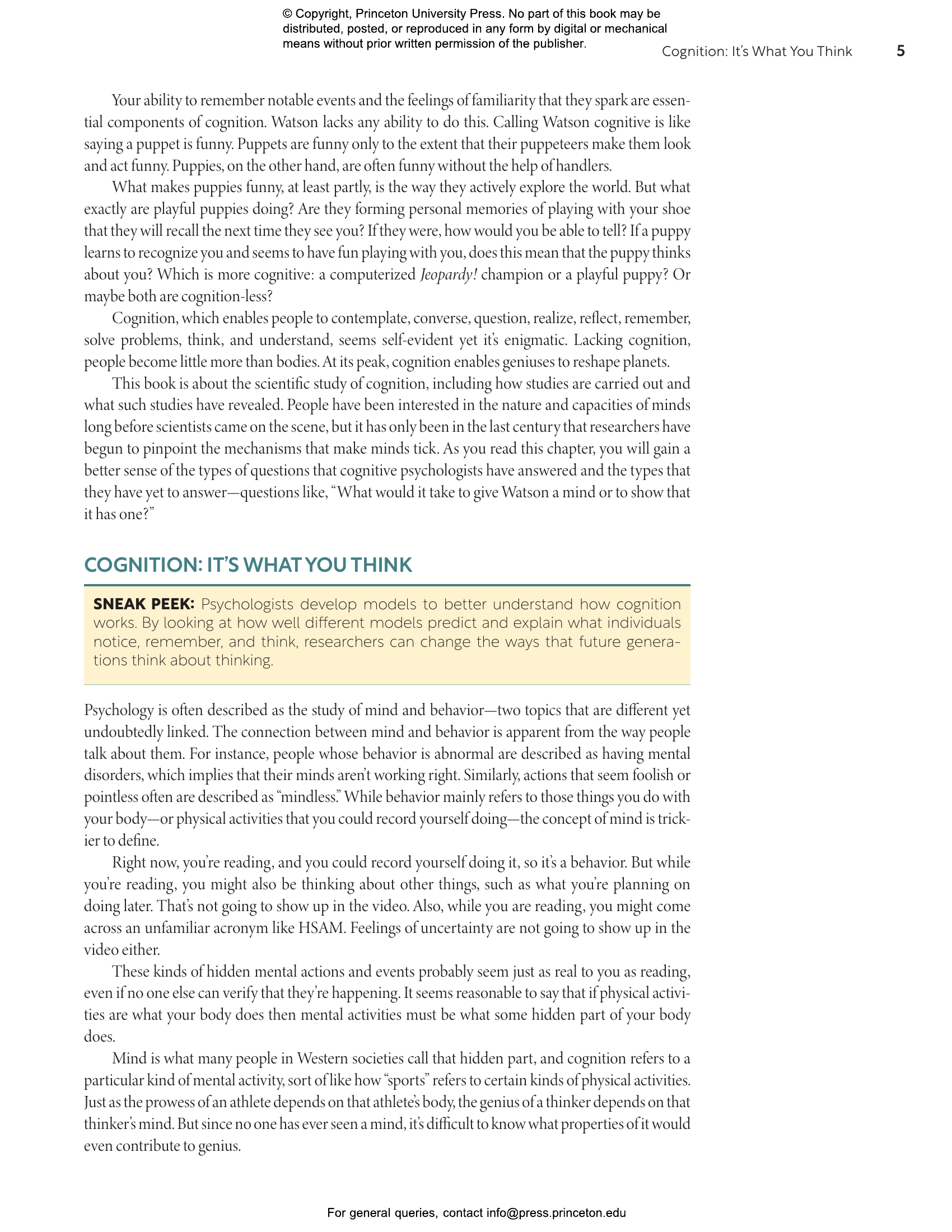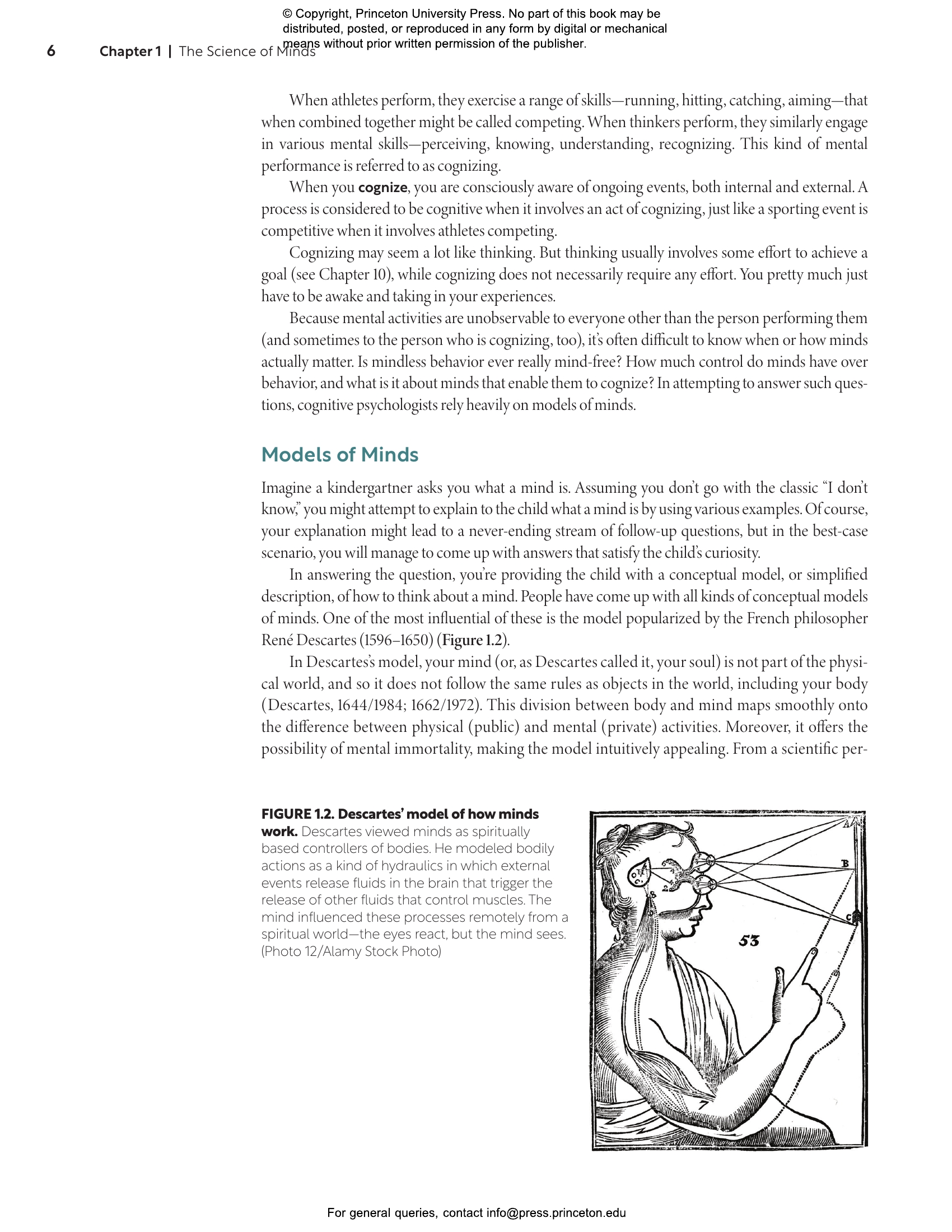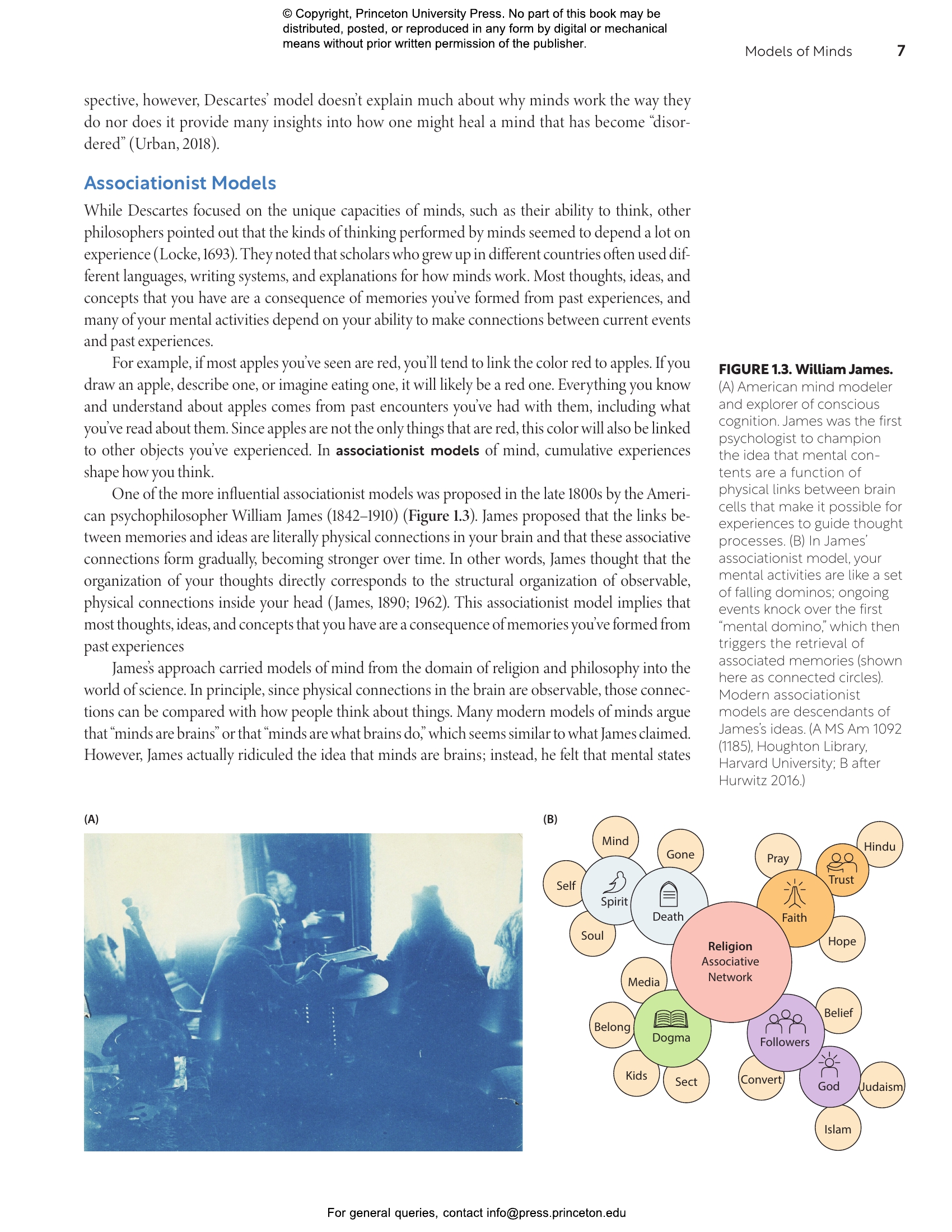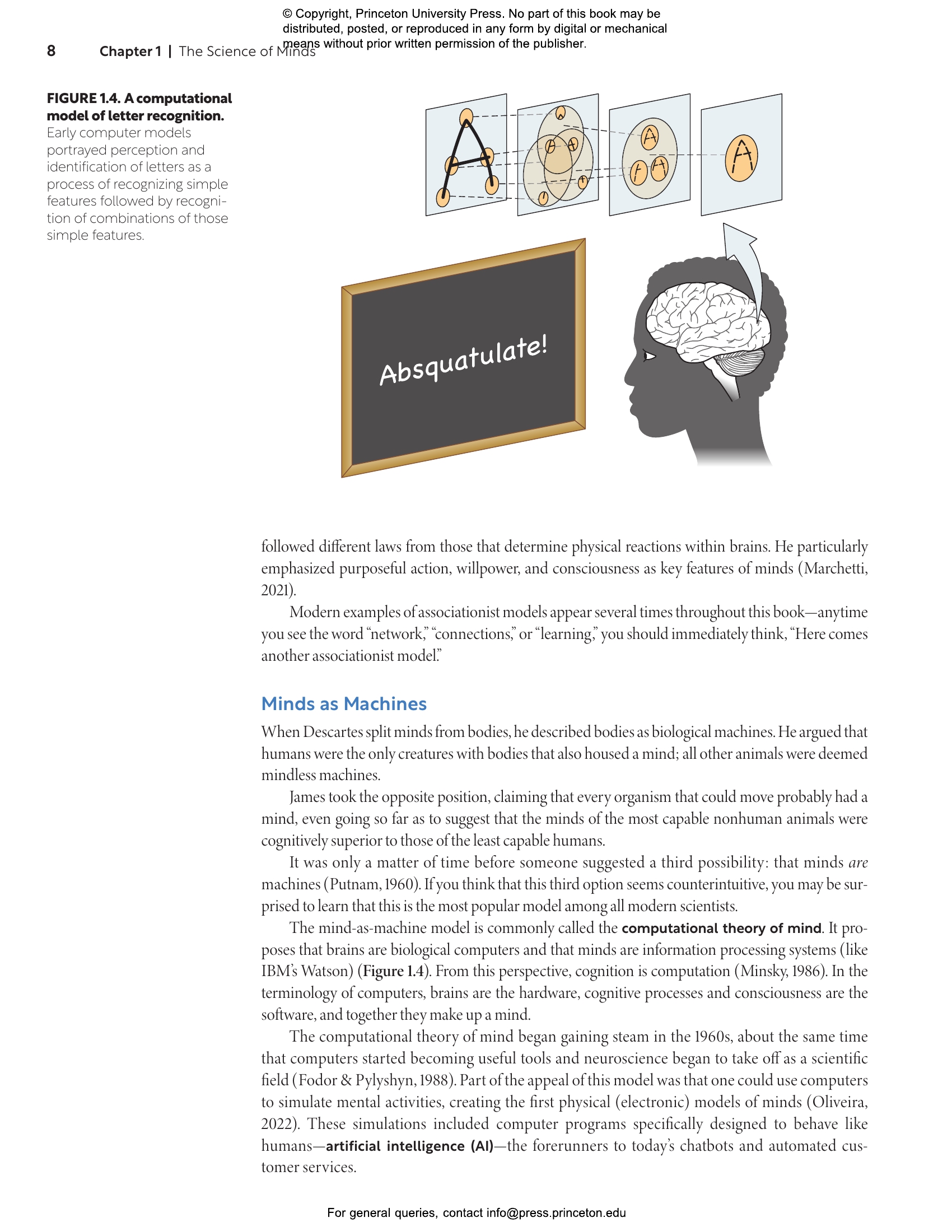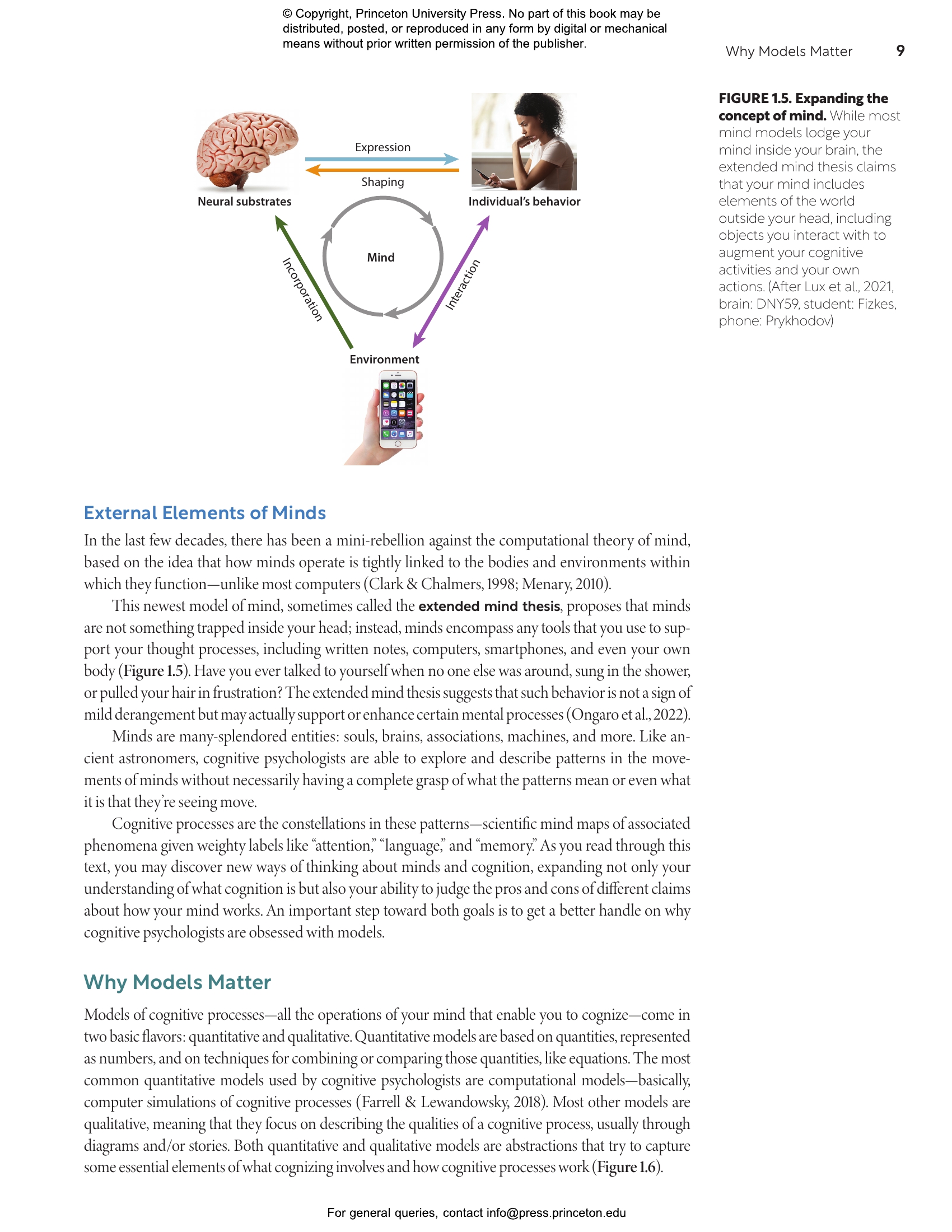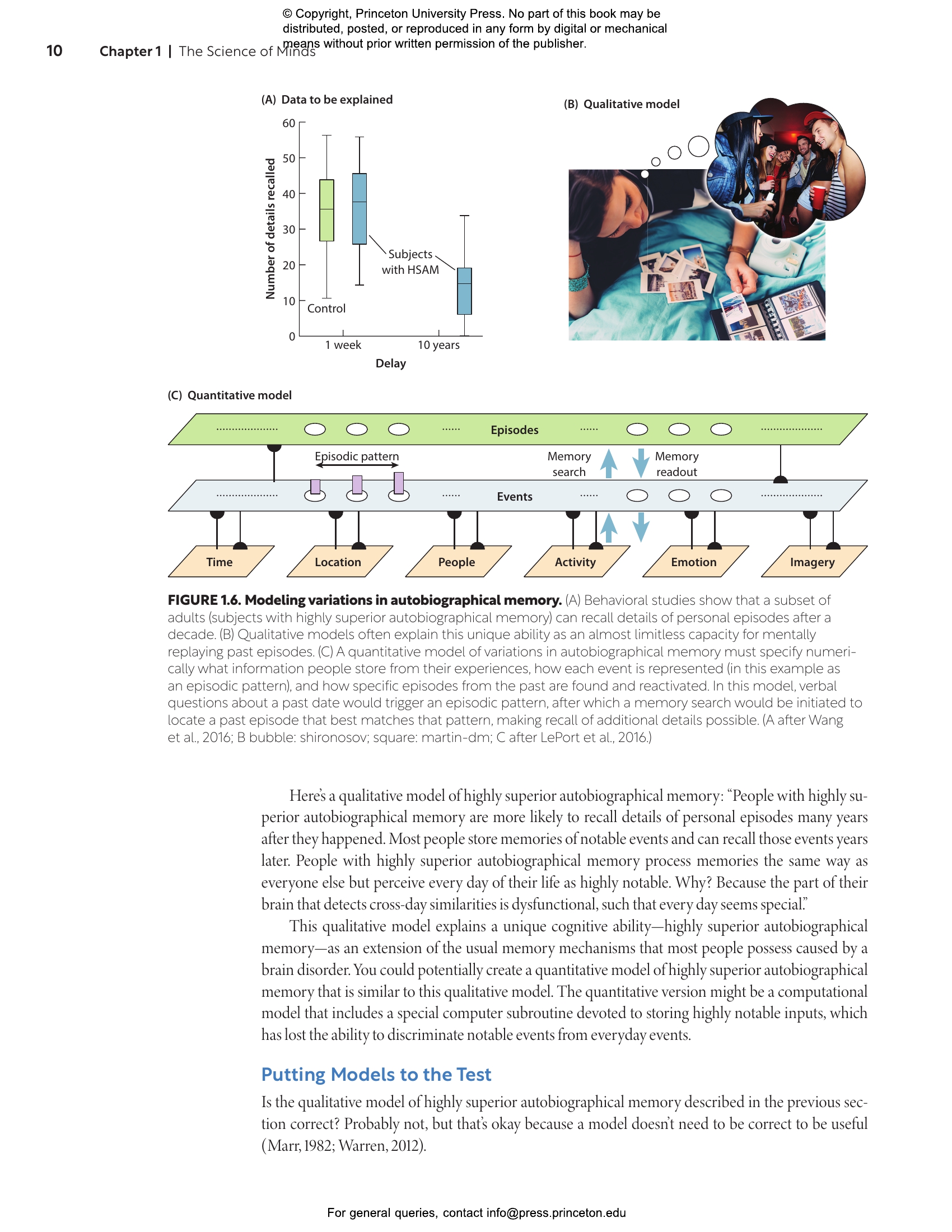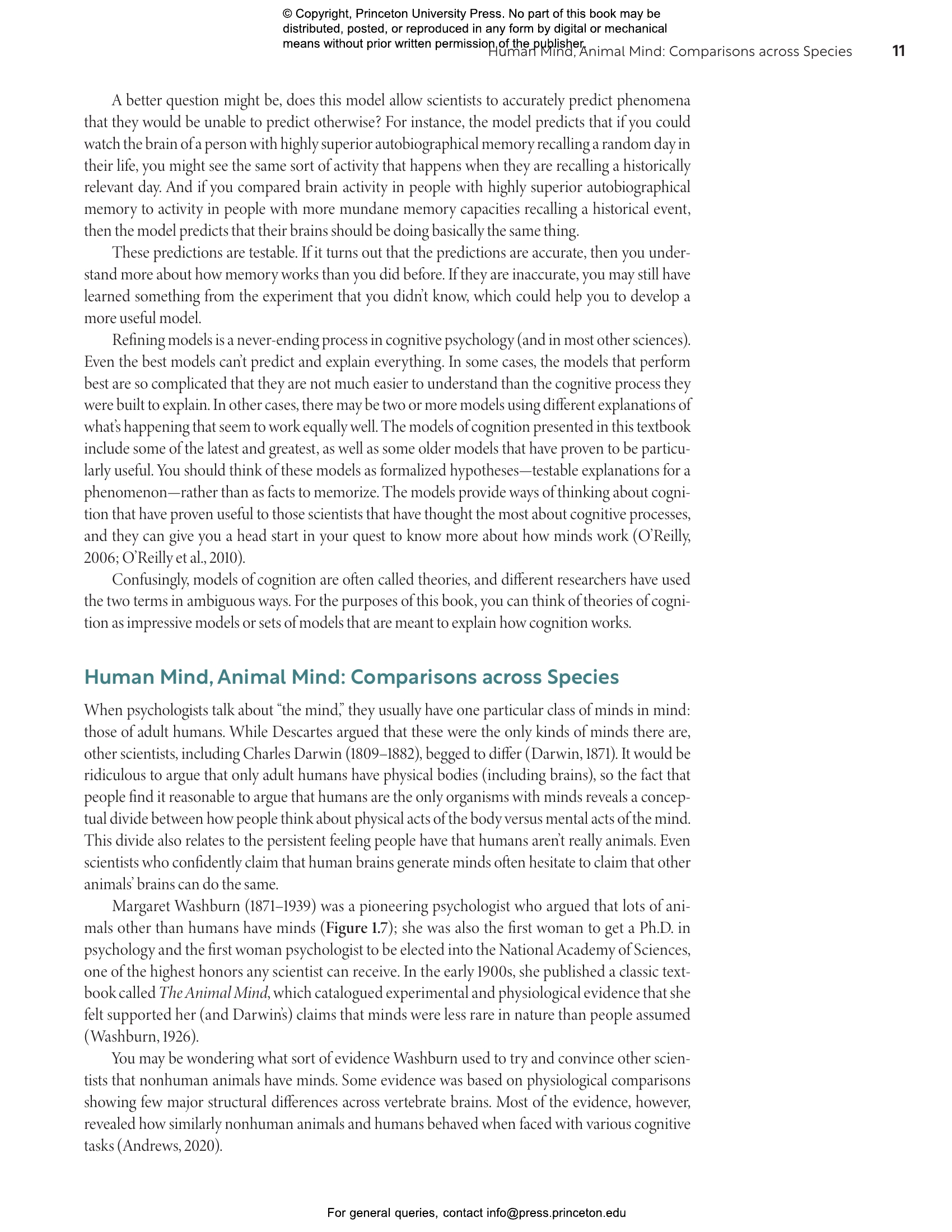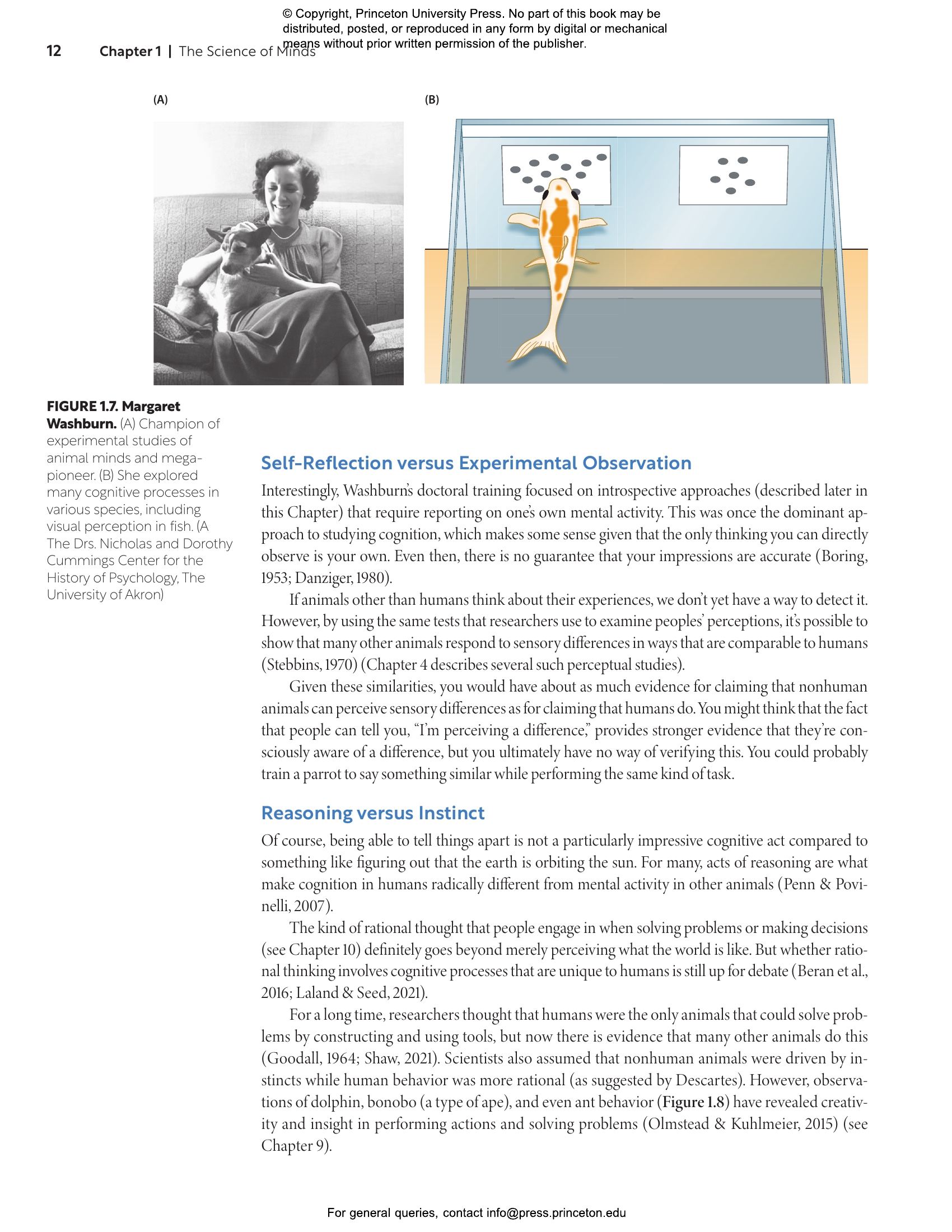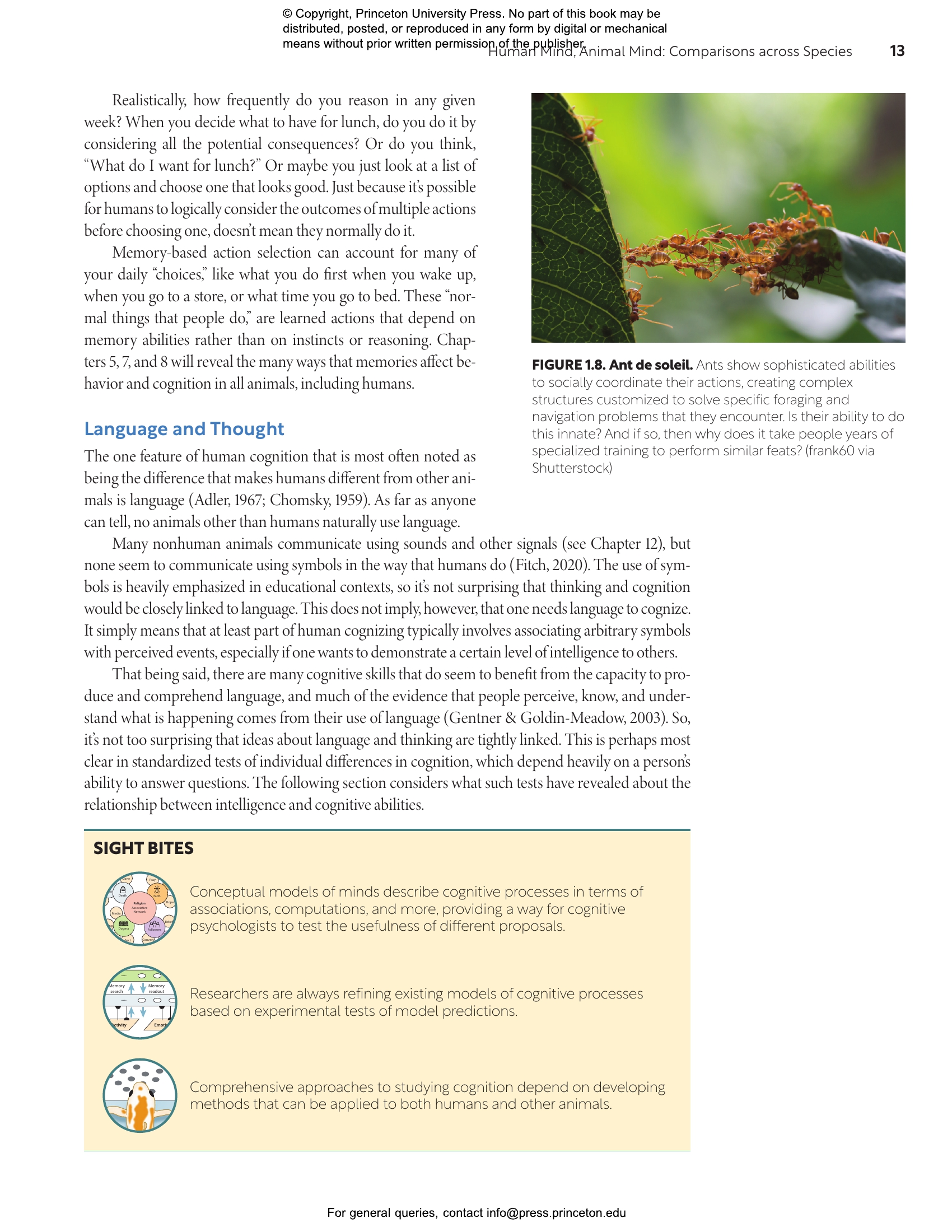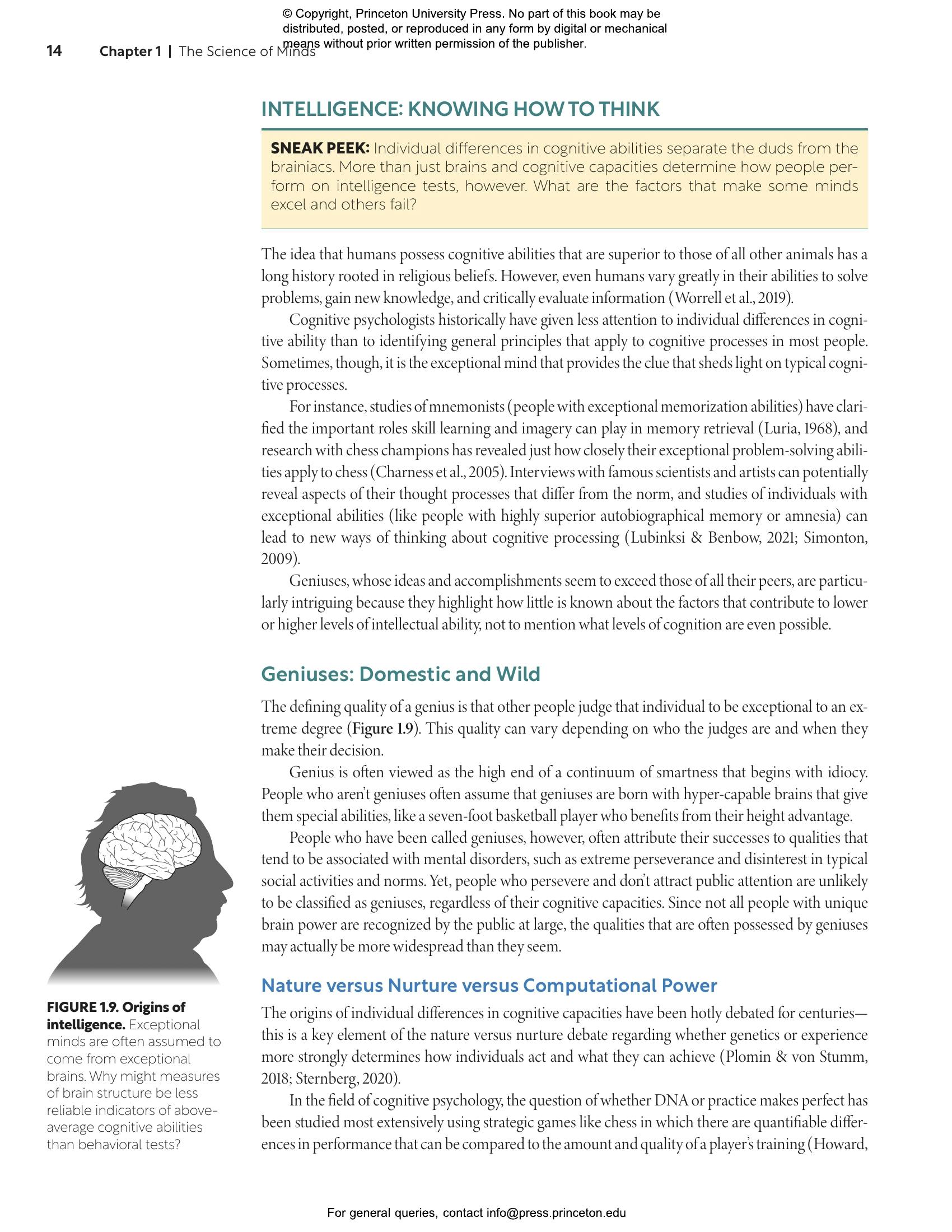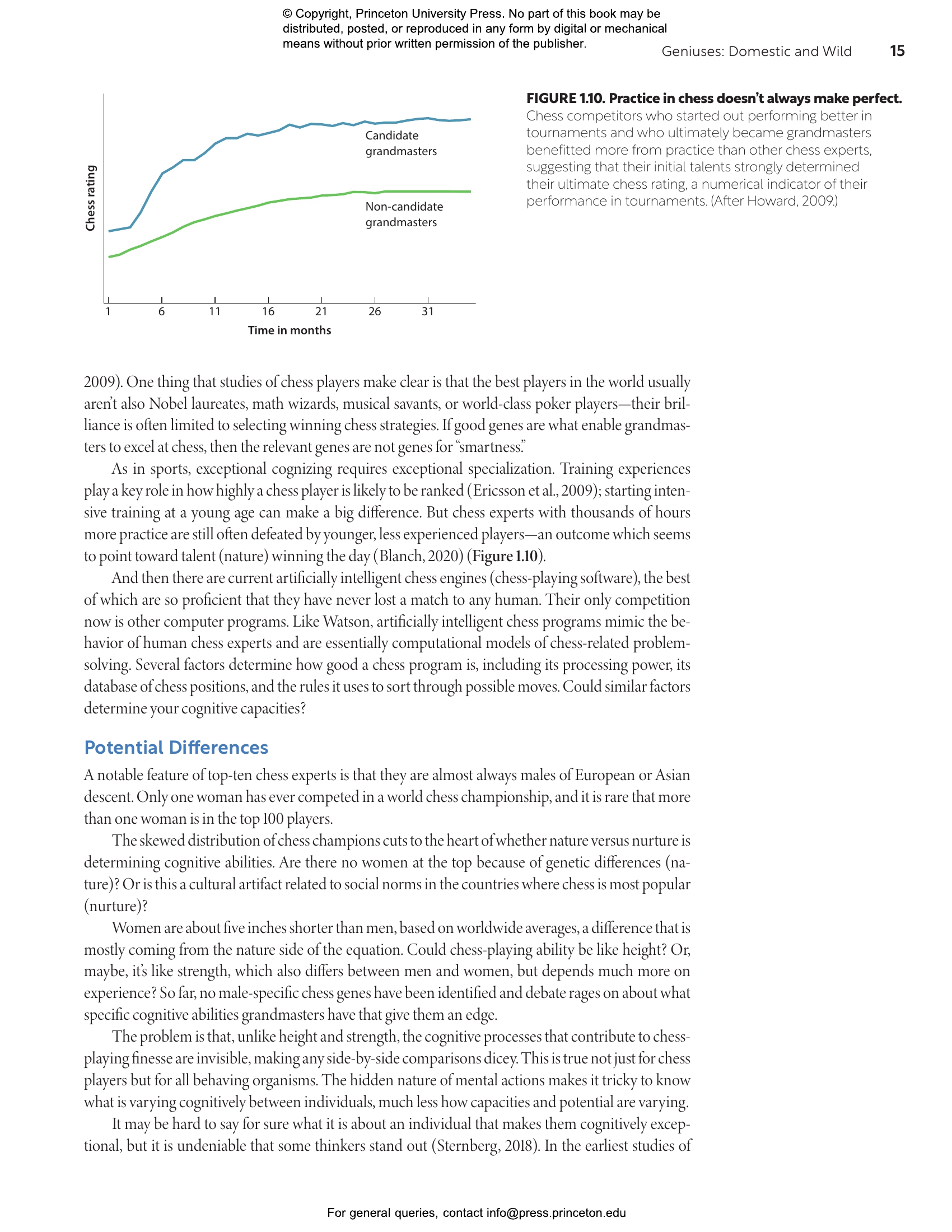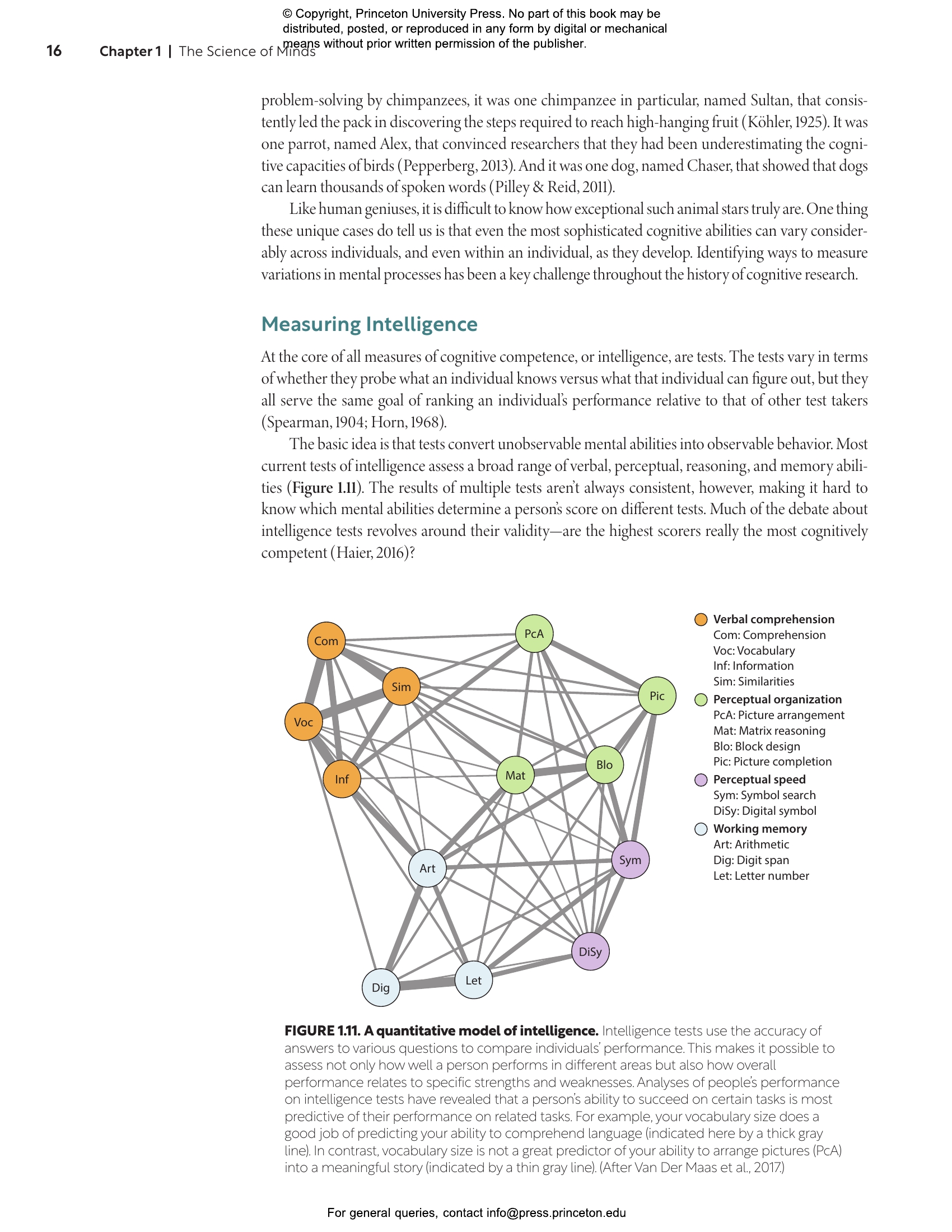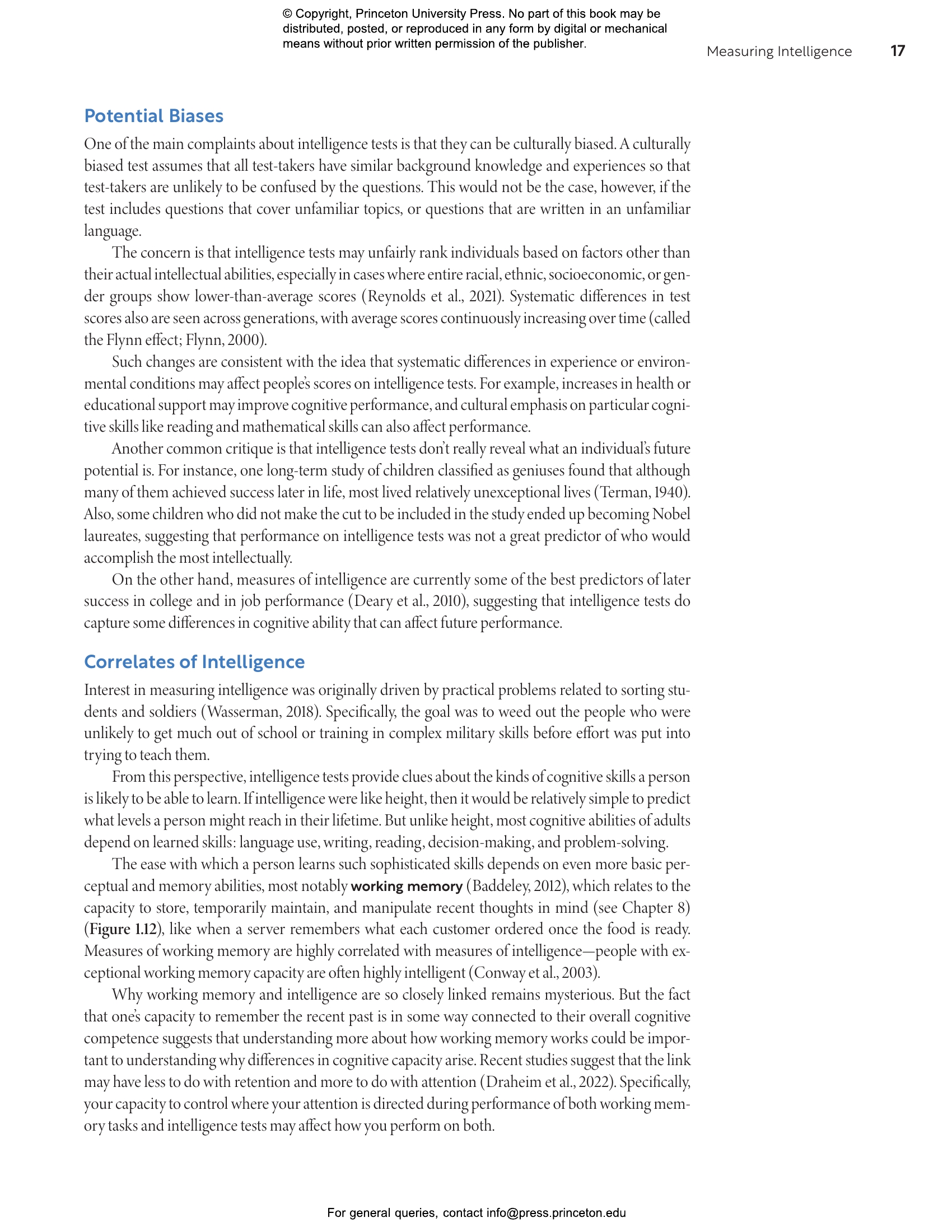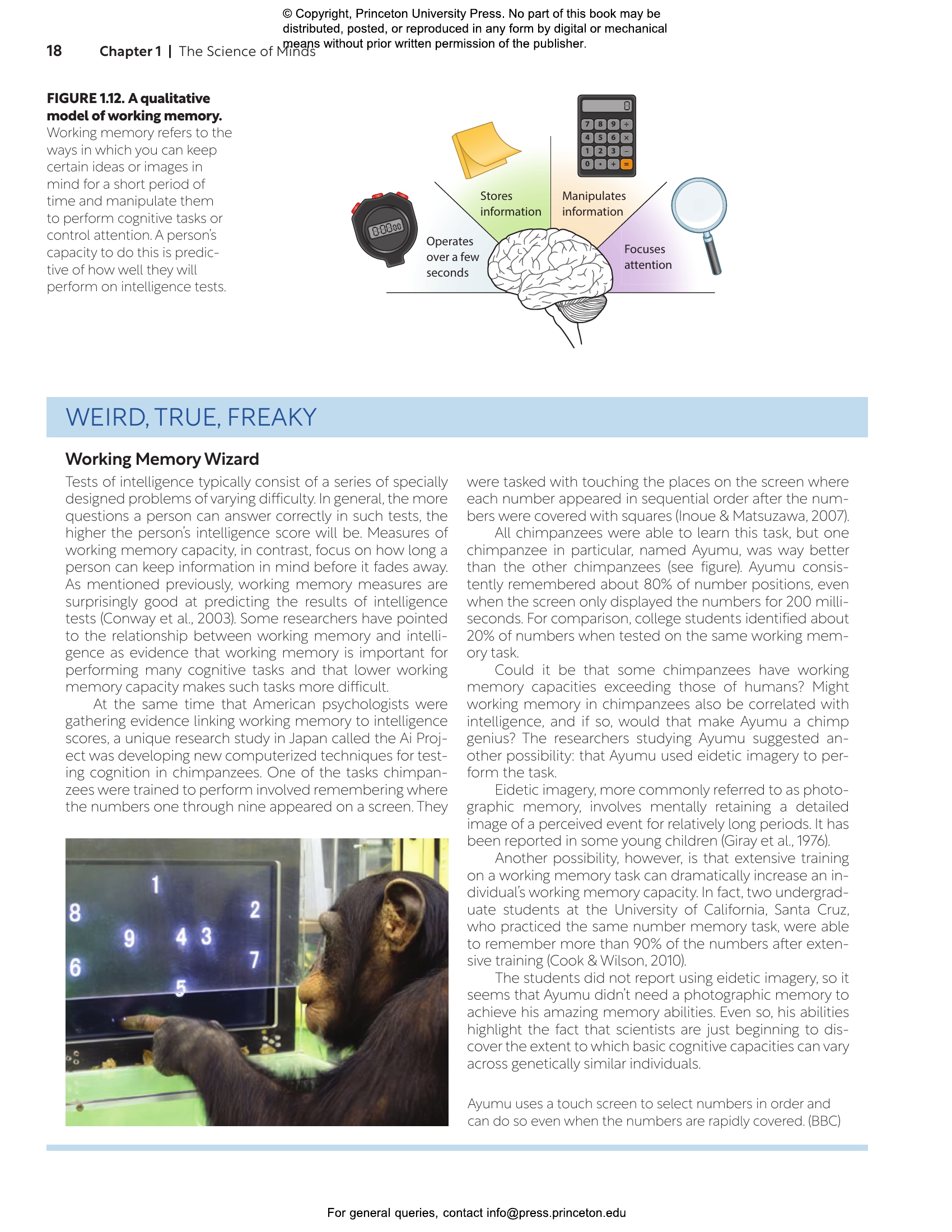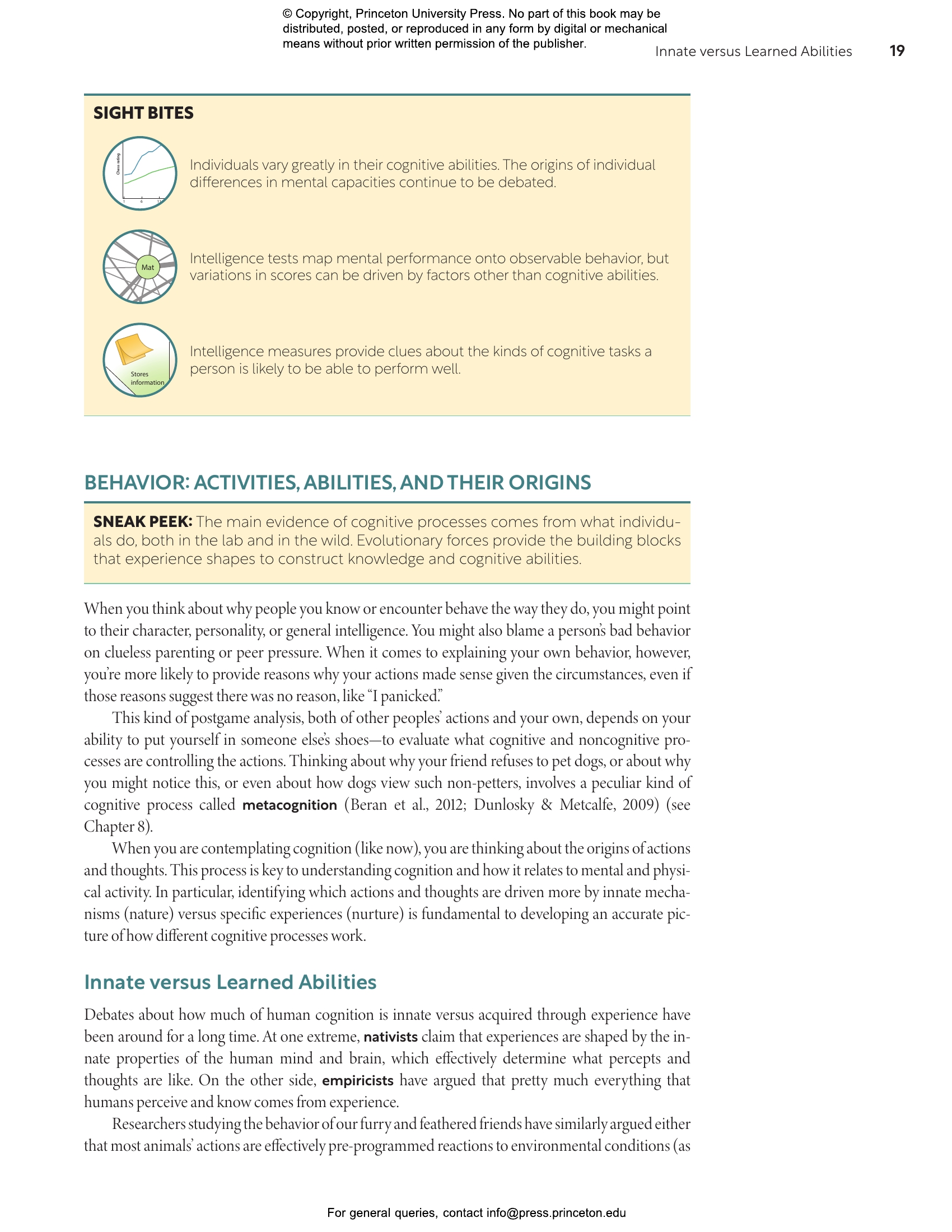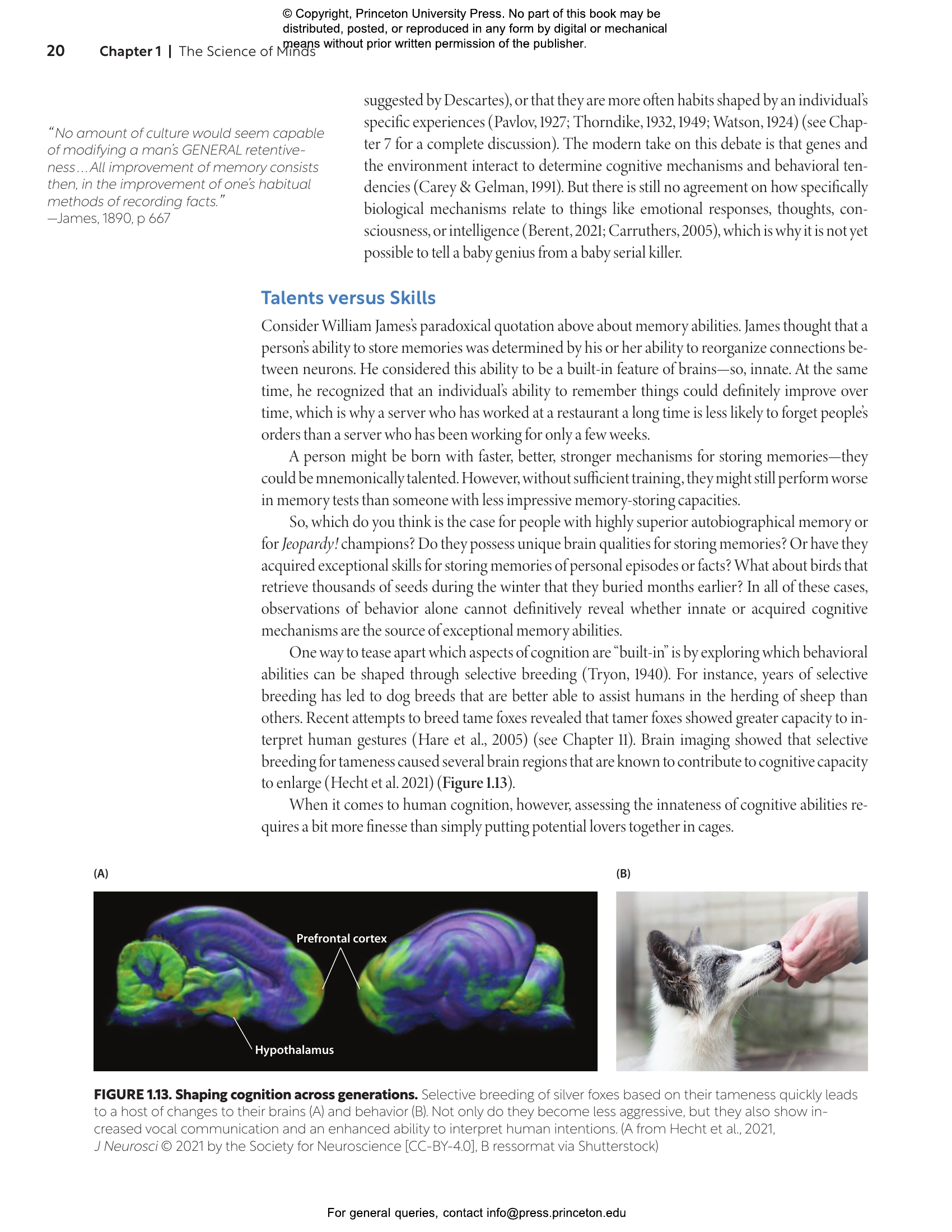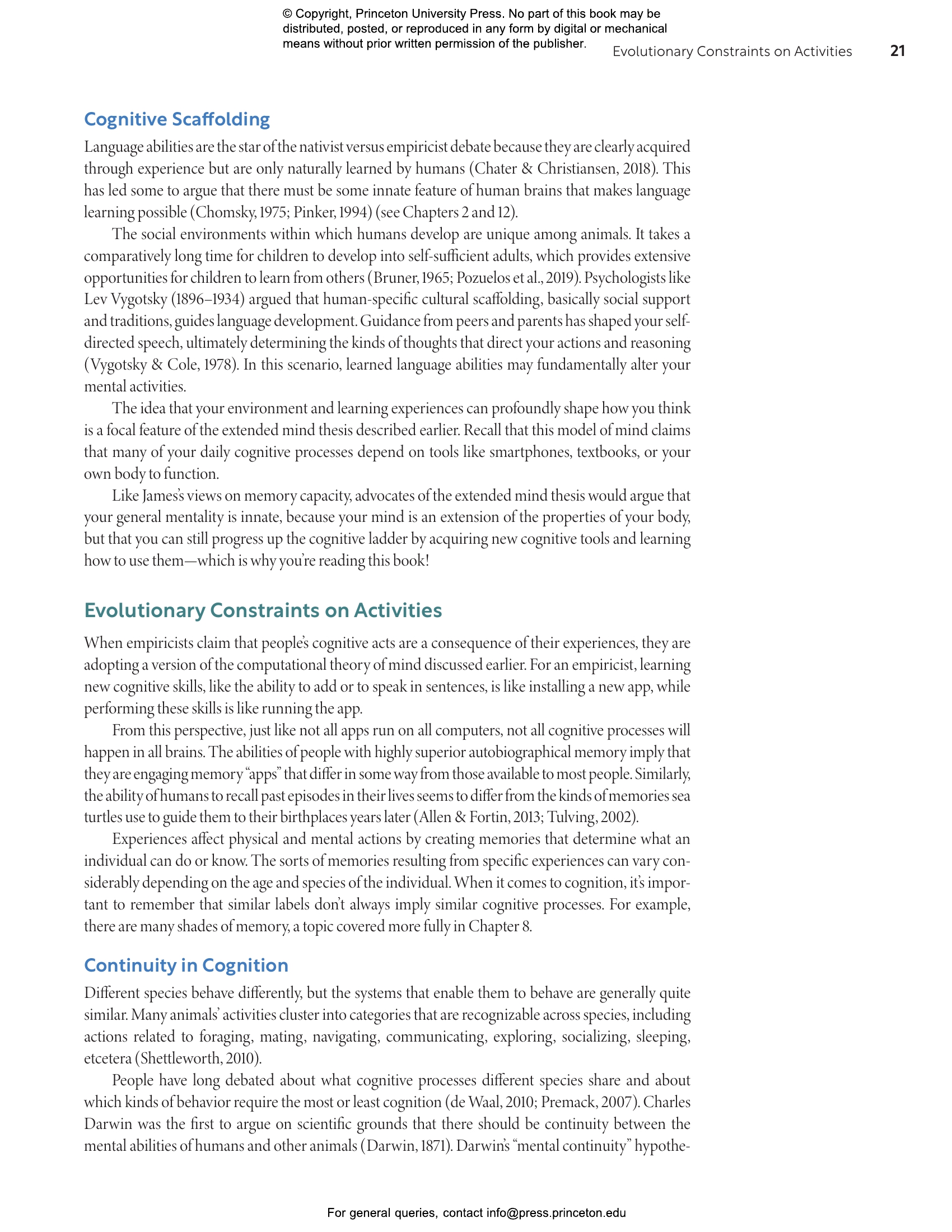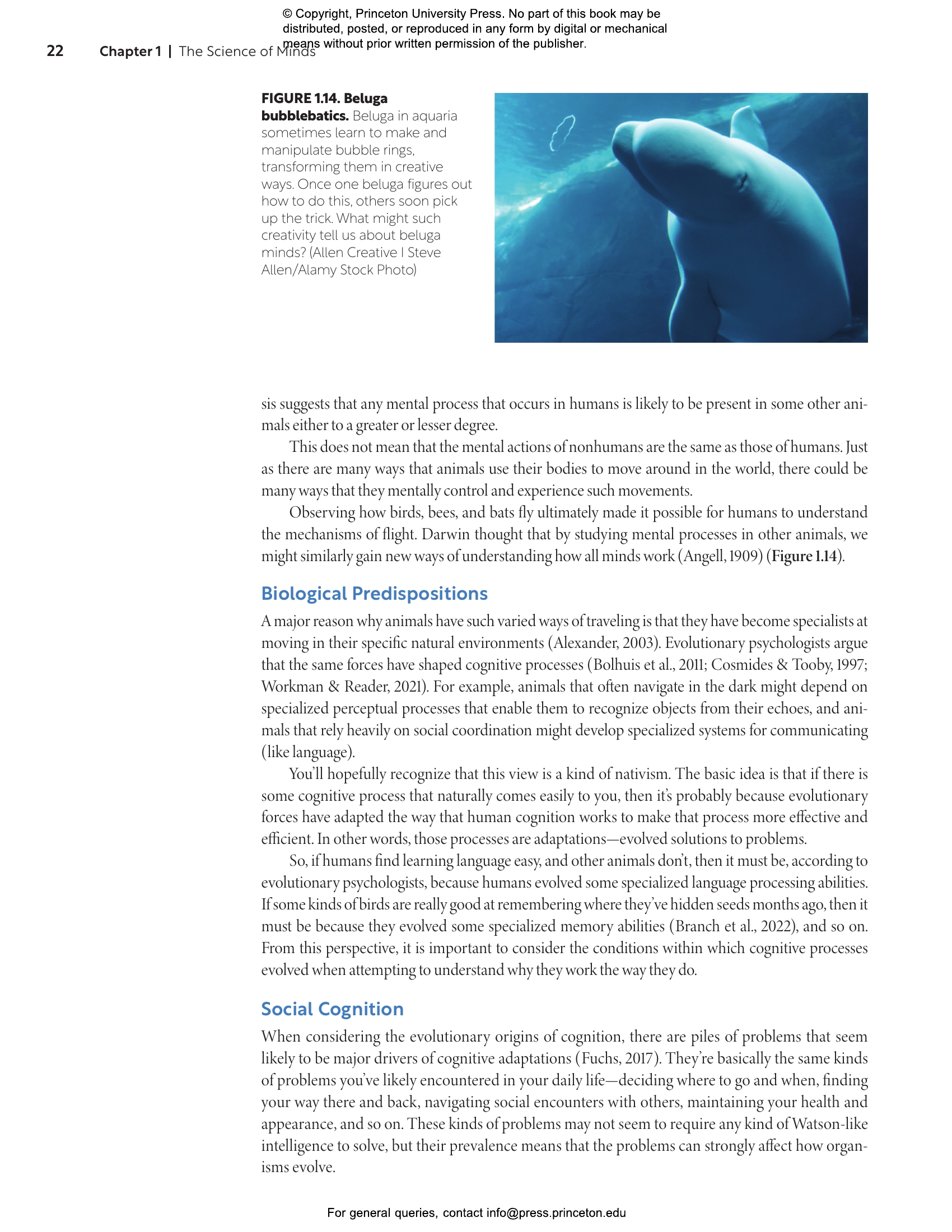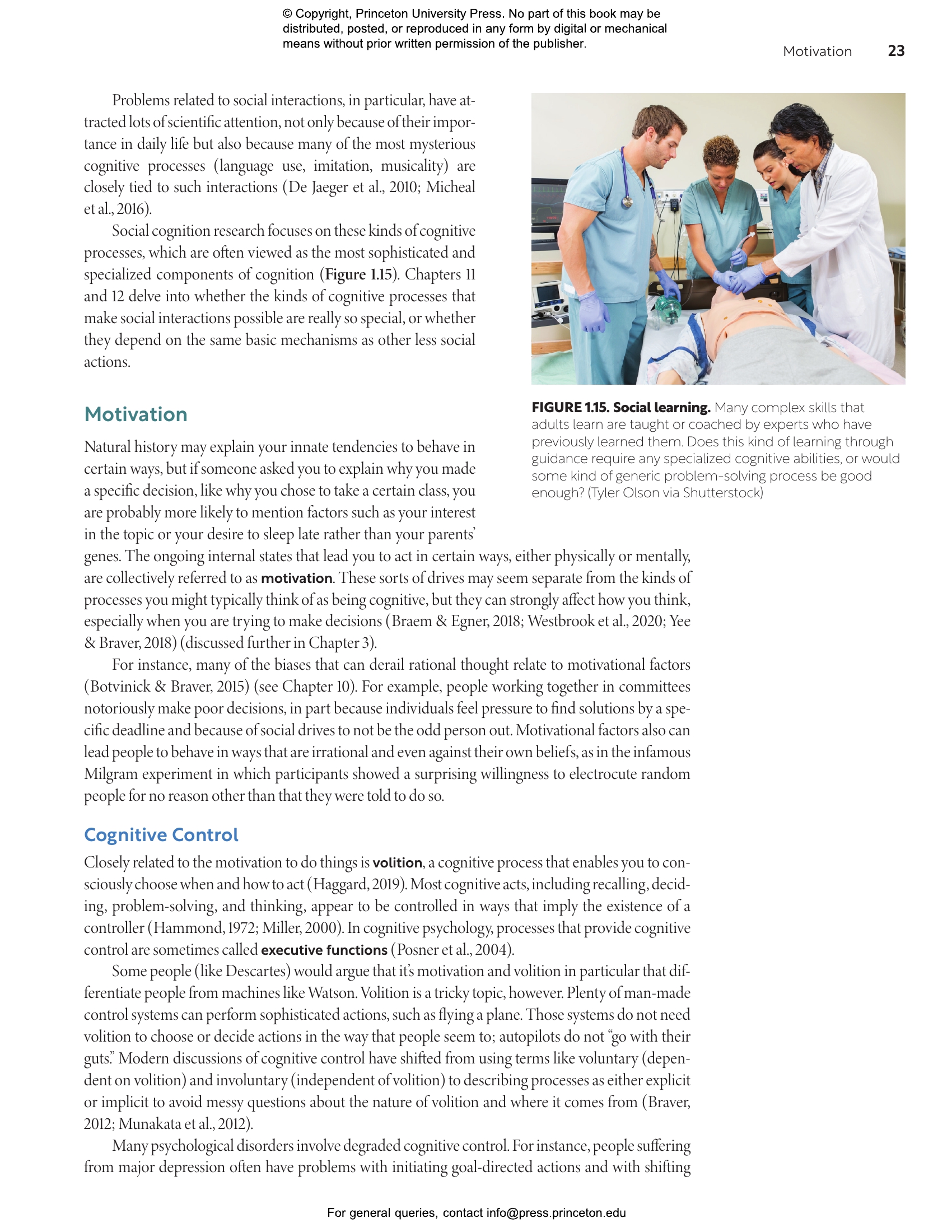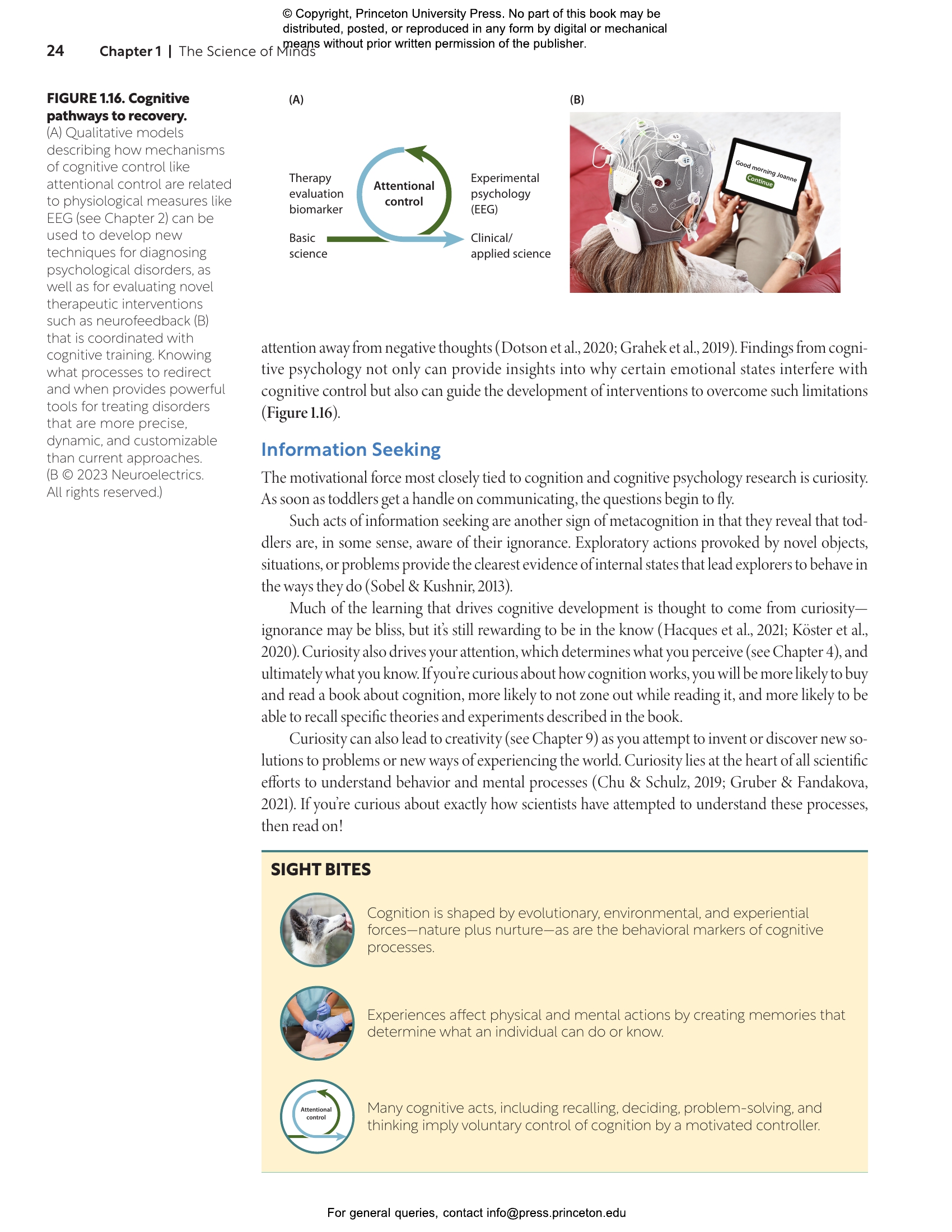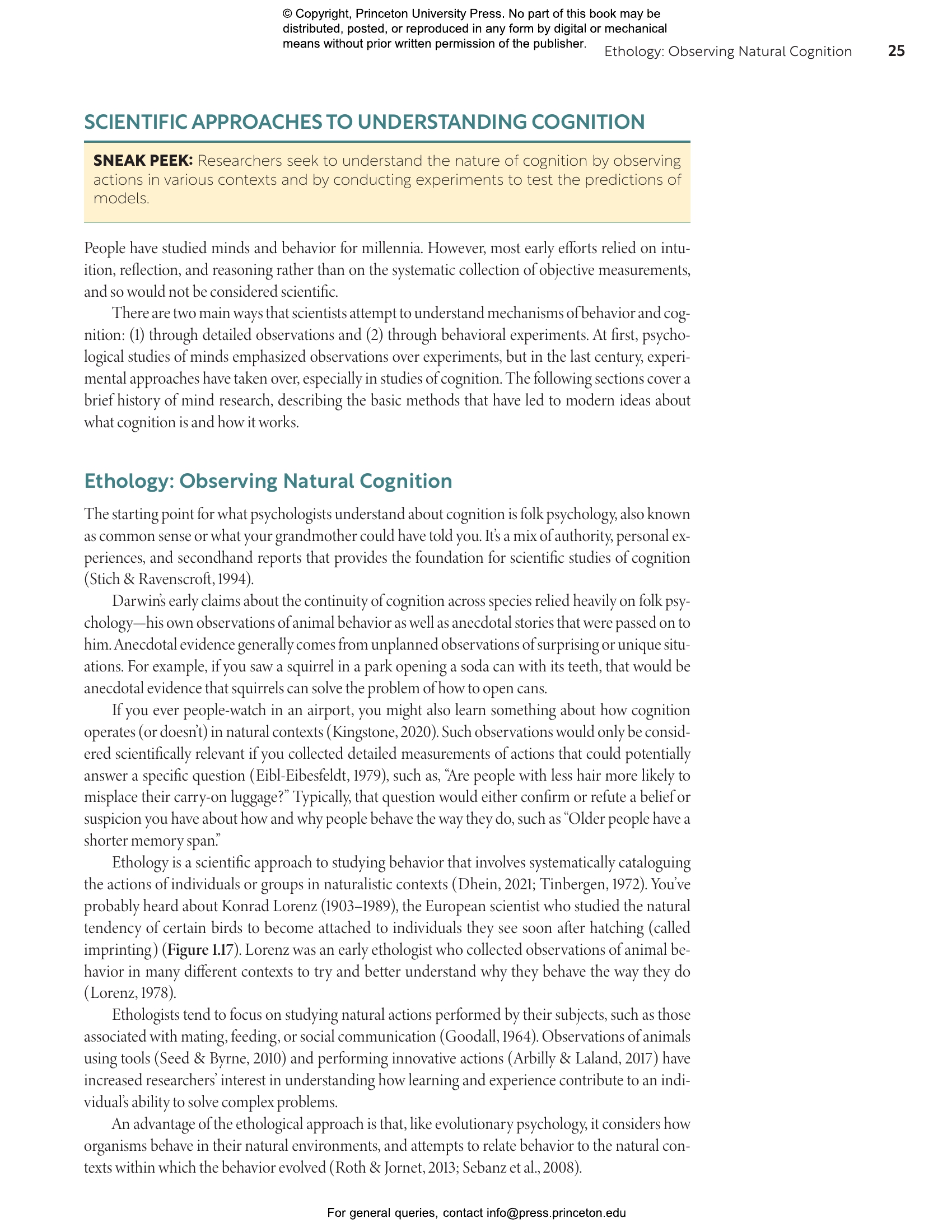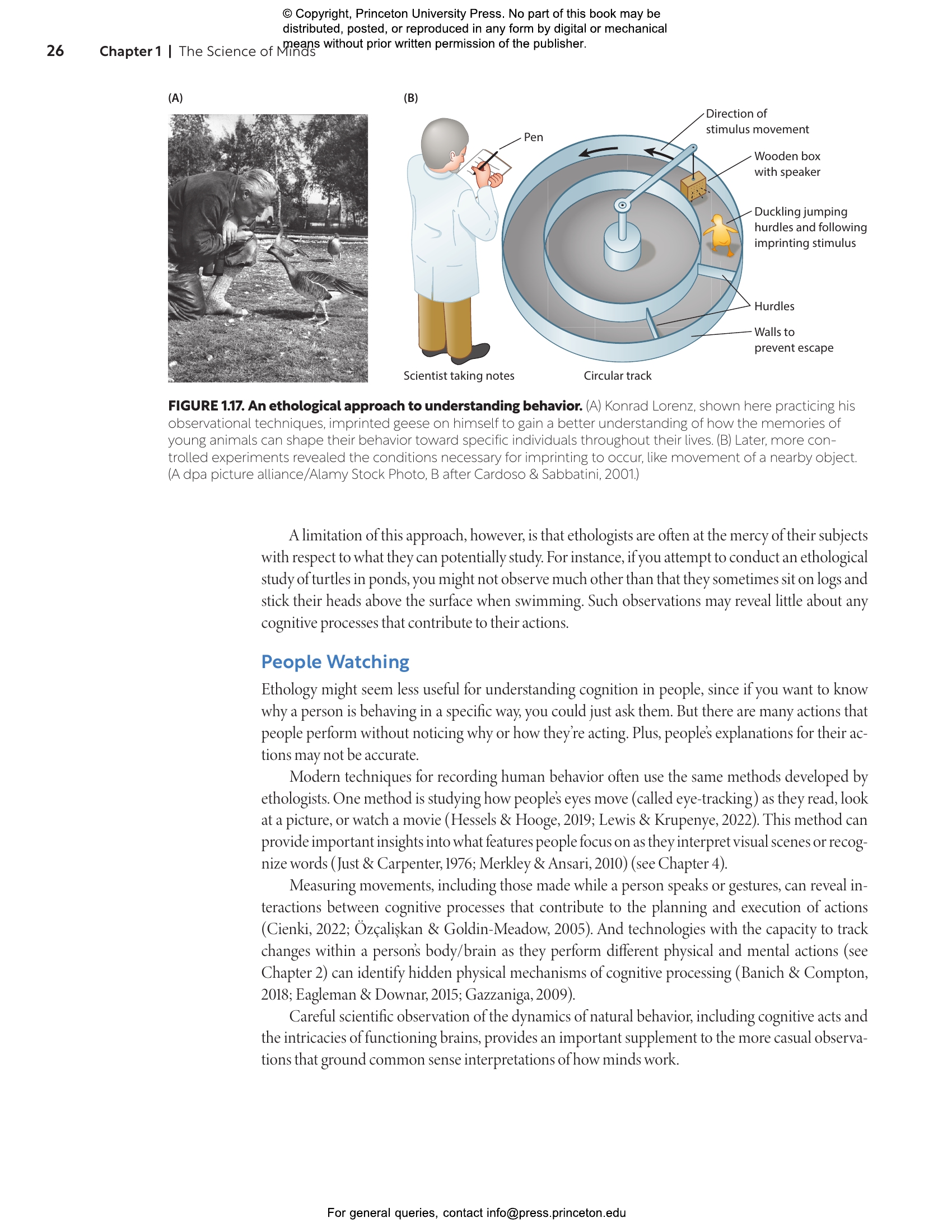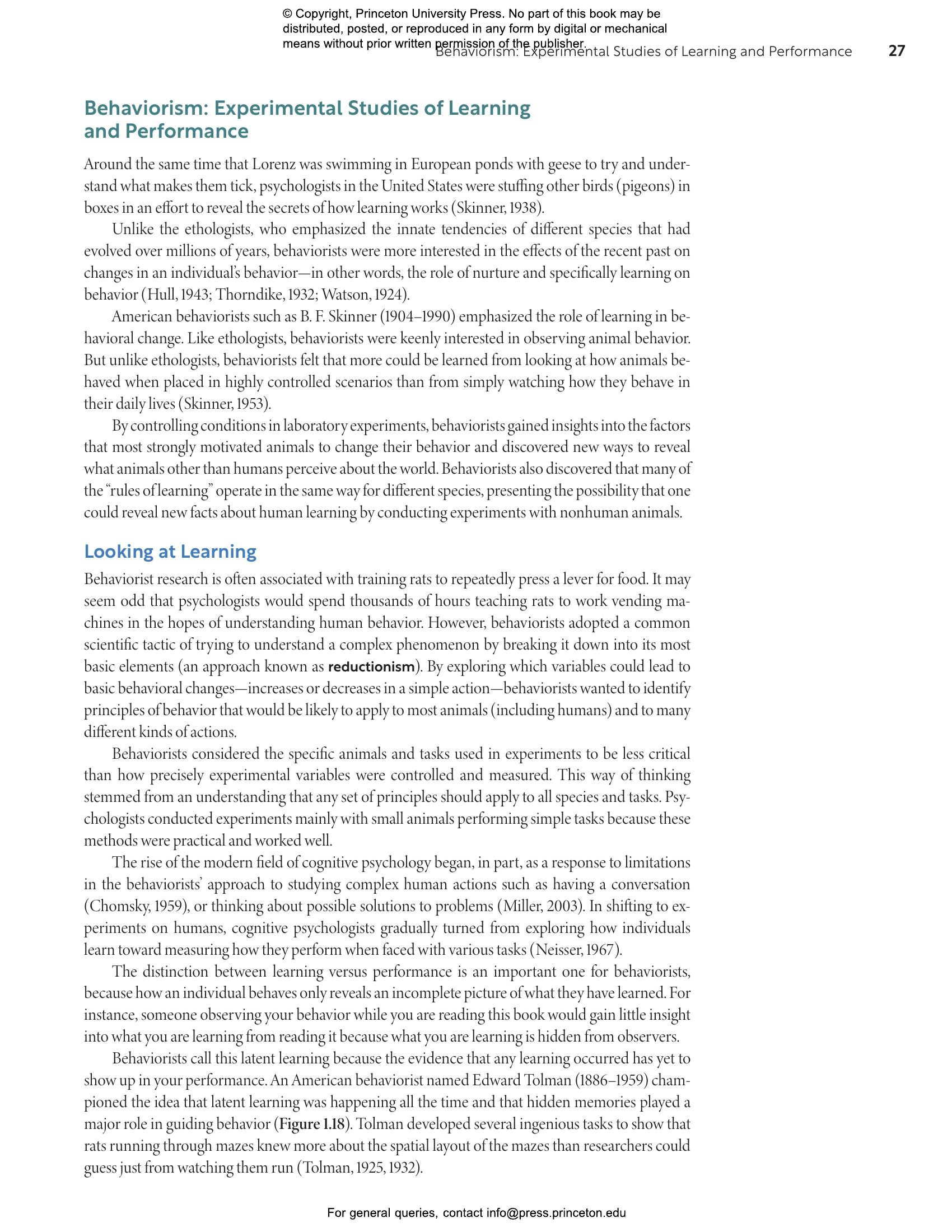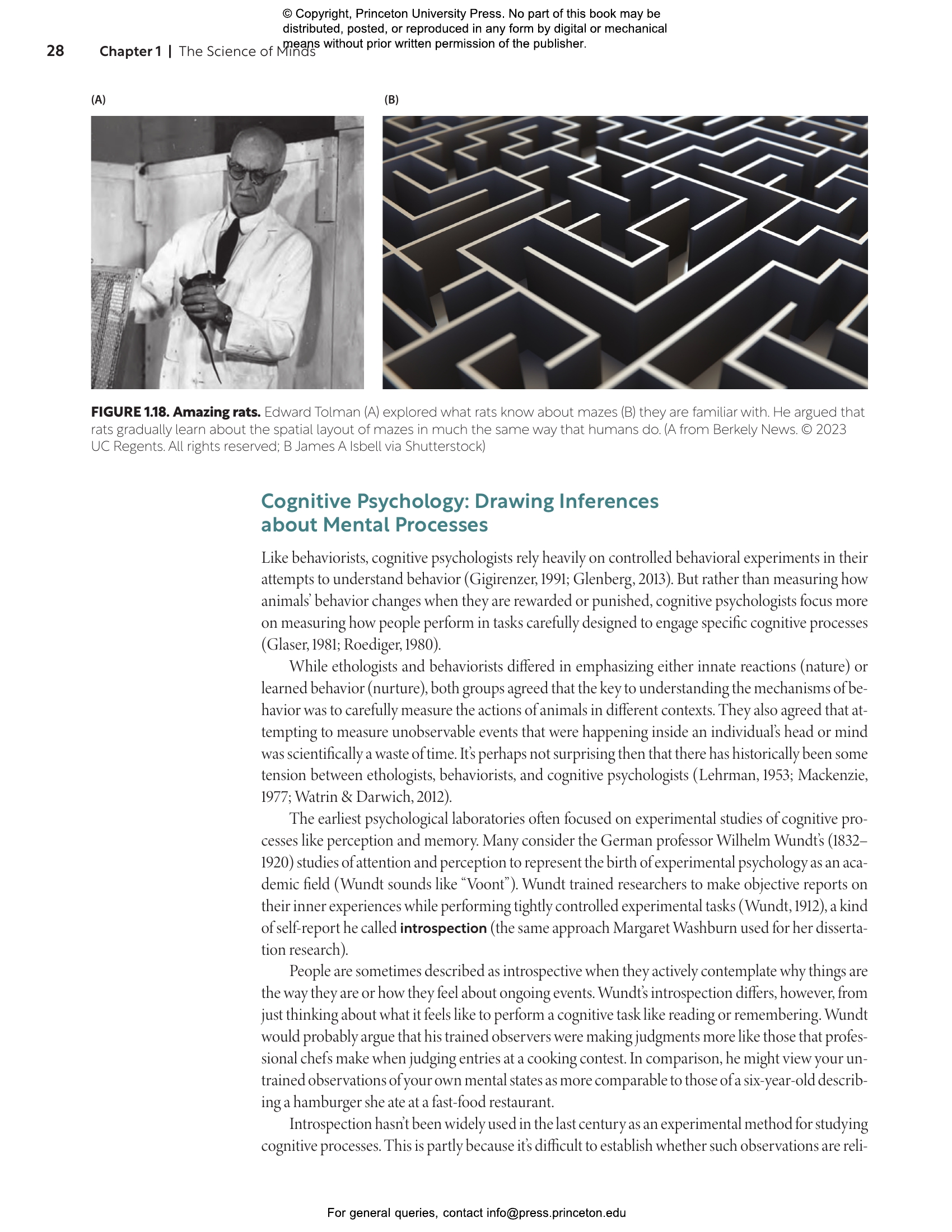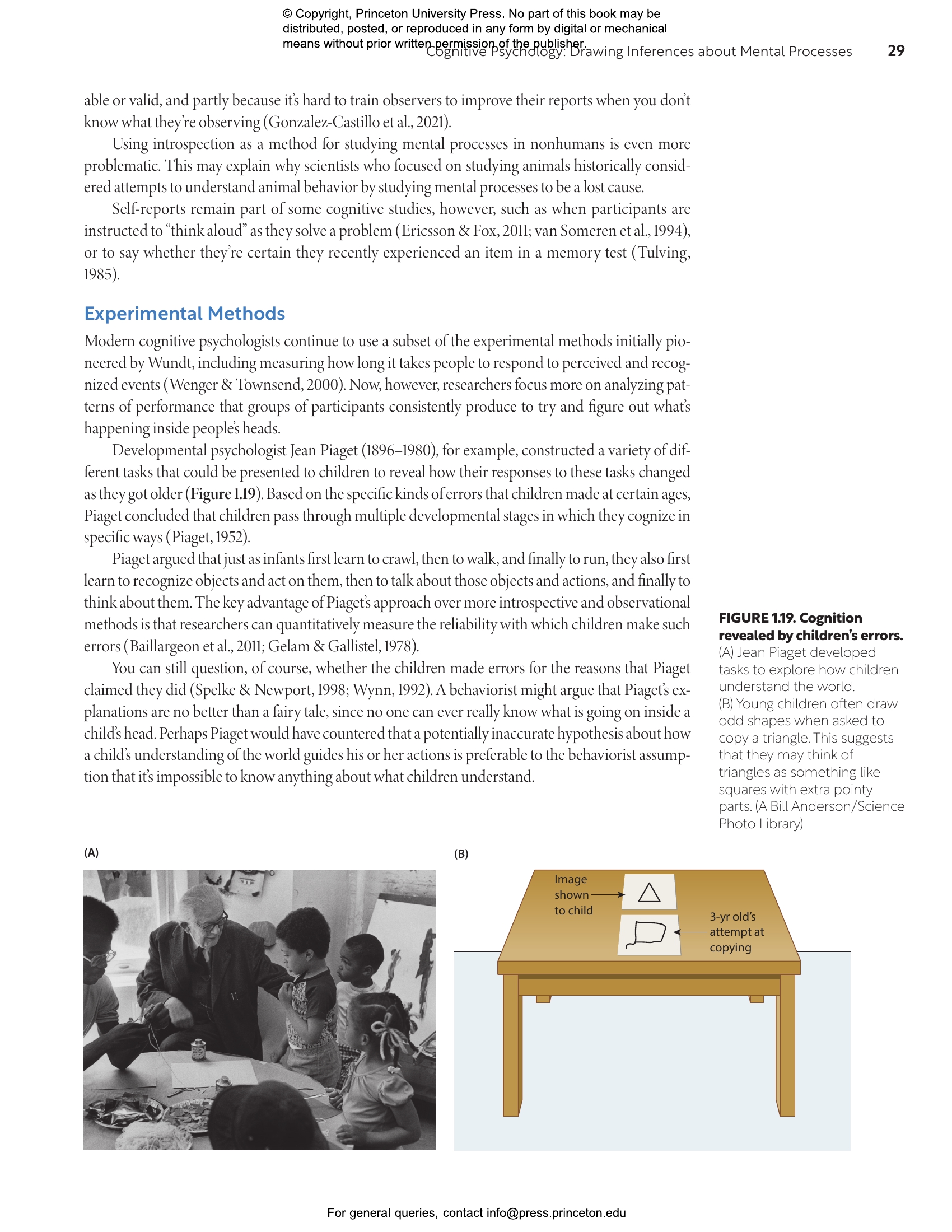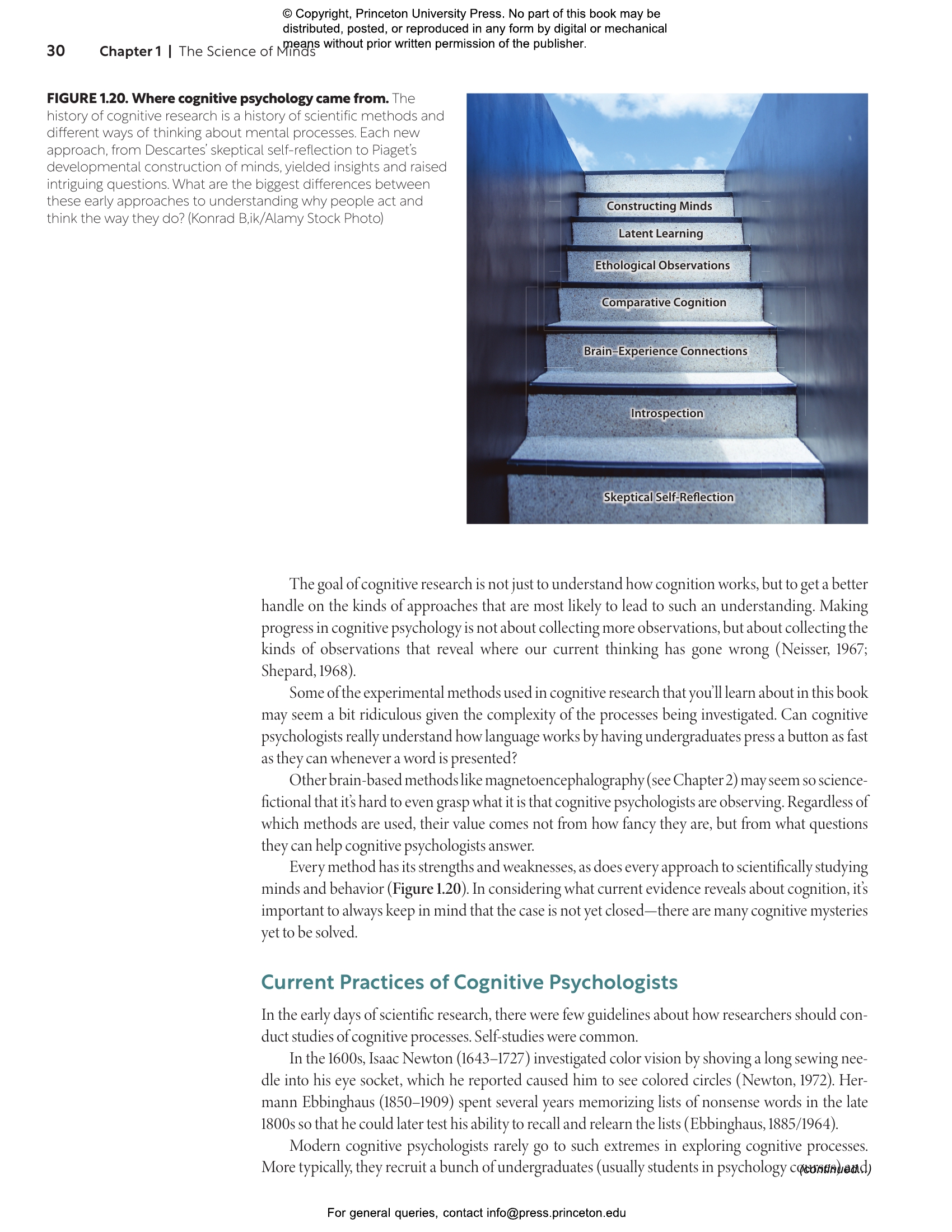Principles of Cognition provides students with an invaluable introduction to the modern science of cognition, blending invaluable insights from behavioral and neuroscientific studies of humans and other animals with unique examples, cutting-edge research summaries, and real-world applications. This accessible textbook builds on the legacy of psychologist William James by emphasizing not only the form cognition takes in laboratory research but also the functional dynamics of cognitive processes in everyday life and the ways they vary across individuals and species. Using an integrative approach that highlights the relevance of cognition across psychological disciplines, it engages students by showing how cognition emerges over time, how cognitive abilities can be improved, and how thinking can be upended by something as simple as falling in love.
- Discusses topics in cognition rarely covered by other textbooks, including perception of time and space, consciousness, animal cognition, mathematical and reading skills, emotions, intelligence, generalization, and social cognition
- Emphasizes learning and its interactions with memory and cognition
- Features practical applications from cognitive research in every chapter
- Connects topics across chapters to promote retention and critical thinking
- Draws on the latest experimental, naturalistic, and applied research
- Integrates findings about animals and children with traditional studies of adults to develop a more neurally grounded framework for thinking about the mechanisms of cognition
- An ideal textbook for undergraduate and graduate classrooms
Eduardo Mercado III is professor of psychology and of ecology, evolution, and behavior at the University at Buffalo, State University of New York, where he is director of the Center for Cognitive Science. He is the author (with Mark A. Gluck and Catherine E. Myers) of Learning and Memory: From Brain to Behavior.
- Preface
- BEGINNINGS
- Chapter 1 The Science of Minds
- COGNITION: IT’S WHAT YOU THINK
- Models of Minds
- Associationist Models
- Minds as Machines
- External Elements of Minds
- Why Models Matter
- Putting Models to the Test
- Human Mind, Animal Mind: Comparisons across Species
- Self-Reflection versus Experimental Observation
- Reasoning versus Instinct
- Language and Thought
- INTELLIGENCE: KNOWING HOW TO THINK
- Geniuses: Domestic and Wild
- Nature versus Nurture versus Computational Power
- Potential Differences
- Measuring Intelligence
- Potential Biases
- Weird, True, Freaky: Working Memory Wizard
- Correlates of Intelligence
- BEHAVIOR: ACTIVITIES, ABILITIES, AND THEIR ORIGINS
- Innate versus Learned Abilities
- Talents versus Skills
- Cognitive Scaffolding
- Evolutionary Constraints on Activities
- Continuity in Cognition
- Biological Predispositions
- Social Cognition
- Motivation
- Cognitive Control
- Information Seeking
- SCIENTIFIC APPROACHES TO UNDERSTANDING COGNITION
- Ethology: Observing Natural Cognition
- Behaviorism: Experimental Studies of Learning and Performance
- Cognitive Psychology: Drawing Inferences about Mental Processes
- Current Practices of Cognitive Psychologists
- CLOSURE
- Chapter 2 Mechanisms of Mind
- INHERITING COGNITIVE MECHANISMS
- Modular Minds
- Mental Faculties versus Mental Organs
- Cognitive Modules
- Evolving New Minds
- Heritability of Aptitudes
- Twins
- Genetic Engineering
- Savants
- Are Genes Relevant to Understanding Cognition?
- DIVERSE BRAINS IN ACTION
- Brain Qualities
- Brain Basics
- Does Size Matter?
- Cortical Complexity
- Figuring Out the Functions of Brain Regions
- Speech Processing
- Tracking Activation
- Neural Circuits
- What Brain Activity Is
- Networks of Neurons
- Synaptic Connections and Neural Interactions
- HOW EXPERIENCE CHANGES BRAINS
- Developmental Processes
- Where Cognition Comes From
- Sensitive Periods and Lost Senses
- Structural Changes
- Enriched Environments, Dendrites, and Learning
- Restoring Control and Repairing Circuits
- Weird, True, Freaky: Surprise! Most of Your Brain Is Missing
- Functional Changes
- Becoming an Expert
- Memory Training
- Academic Interventions
- USING ANIMAL MODELS TO STUDY COGNITION
- Comparing Cognitive Effects of Brain Changes
- Shared Capacities
- Animal Models of Developmental Processes
- Cognitive Prosthetics
- What Distinguishes Brains from Minds?
- Brains as Biocomputers
- Worm Minds
- CLOSURE
- Chapter 3 Conscious Cognitive Processes
- THE SCIENCE OF CONSCIOUSNESS
- Signs of Consciousness
- Levels of Consciousness
- Altering Conscious States
- Neural Correlates of Consciousness
- Cortical Contributions to Conscious States
- Subcortical Contributions to Consciousness
- Implicit Cognition
- Blindsight
- Subliminal Perception
- Priming
- Weird, True, Freaky: Surgery Under Hypnosis
- VOLUNTARY CONTROL OF THOUGHTS AND ACTIONS
- Initiating Actions
- Chains of Command
- Impressions of Control
- Control Systems
- Maintaining Control
- Reflexes and Habits
- Competing Controllers
- Developing Cognitive Systems
- Coordinating Actions
- Self-Organizing Development
- Learning How to Walk and Talk
- EMOTION AND COGNITION
- Expressing Emotions
- Emotional Triggers and Emotional Reactions
- Empathy and Emotional Perception
- Emotional Regulation
- The Role of Emotion in Perception, Memory, and Decision-Making
- Emotional Distortions of Perception
- Memorable Episodes and Conditioned Emotional Responses
- Decision-Making
- Resisting the Urge
- Obsessive-Compulsive Disorder and Uncontrollable Thoughts
- Herd Mentality
- Self-Regulated Learning
- AWARENESS AND THOUGHT
- Recognizing Minds
- The Birth of Minds
- Theory of Mind
- Consciousness in Infants and NonHumans
- The Psychologist’s Fallacy
- What It Is Like To Be Cognizant
- Comparing Conscious States
- Qualia
- Introspection Revisited
- CLOSURE
- KNOWING THAT
- Chapter 4 Perception, Recognition, and Attention
- BEHAVIORAL PROCESSES
- Recognizing Objects, Agents, and Events
- Perceptual Representations of Things and Beings
- Links Between Perception and Action
- Modeling Perception
- Weird, True, Freaky: Seeing Colors that Don’t Exist
- Attention
- Selective Attention and Divided Attention
- Sustained Searching
- Models of Attention
- BRAIN SUBSTRATES
- In Search of a Face Recognition Module
- Neural Selectivity for Faces
- Processing Features of Faces
- Models of Face Recognition
- What Attentive Brains Look Like
- Monitoring Attentional Correlates
- Attentional Networks
- Attentional Modulation of Neural Activity: More Models
- APPLIED PERSPECTIVES
- Media Multitasking
- Heavy Media Multitasking
- Multitasking Capacity
- Learning to See and Hear
- Sensitive Periods for Perceptual Development
- CLOSURE
- Chapter 5 Categorization and Discrimination
- BEHAVIORAL PROCESSES
- Kinds of Categories and Concepts
- Perceptual Categories
- Weird, True, Freaky: The Uncanny Valley
- Functional Categories
- Abstract Concepts
- Theories of Categorization
- Explaining Perceptual and Functional Categorization
- Modeling Meaning within Categories
- Category Learning
- Lumpers versus Splitters
- Where Do Categories Come From?
- Learning Perceptual Categories
- Forming Complex Concepts
- Processes of Discrimination
- Becoming a Perceptual Expert
- Learning to Perceive Differences
- BRAIN SUBSTRATES
- How Categories are Represented in Brains
- How Cortical Neurons Respond to Category Members
- Changing How Cortical Neurons Respond to Category Members
- The Roles of Prefrontal Cortex
- Learning Implicit Categories
- Impaired Learning of Probabilistic Categories
- Information Integration
- Categorizing with Distributed Networks
- Complementary Mechanisms of Category Learning
- Distributed Representations of Categories and Concepts
- APPLIED PERSPECTIVES
- Sorting Smells to Save Lives
- Dog Detectives
- Rescue Rats
- Spotting Threats in Baggage
- CLOSURE
- Chapter 6 Time, Space, and Number
- BEHAVIORAL PROCESSES
- Timing and Time Perception
- Synchronizing Actions with External Events
- Timing Intervals
- Models of Time Tracking
- Spatial Cognition
- Spatial Perception and Action
- Spatial Navigation
- Weird, True, Freaky: Celestial Dung Beetles
- Models of Spatiotemporal Processing
- Numerical Competence
- Assessing Quantities
- Numerical Operations
- Links Between Time, Space, and Number
- BRAIN SUBSTRATES
- Tracking Movements Through Space
- Place Cells
- Head Direction Cells
- Border and Grid Cells
- Beyond Cognitive Maps
- Links Between Spatial Processing and Other Cognitive Processes
- Chemically-Induced Time Warping
- Temporal Distortion in Parkinson’s Patients
- Where are the Brain Clocks?
- Cortical Representations of Time
- High Time
- APPLIED PERSPECTIVES
- Mastering Math Skills
- Predicting Intelligence from Numerosity Perception
- Why Counting on Your Fingers Makes Calculations Easier
- When Math is More than Tough
- Rhythm Matters
- Learning Mom Time
- Using Rhythm to Counteract Cognitive Decline
- CLOSURE
- MEMORY
- Chapter 7 Acquiring and Applying Memories
- BEHAVIORAL PROCESSES
- Learning to Predict Significant Events: Pavlovian Conditioning
- Recognizing Predictable Sequences
- Extinguishing Learned Associations
- Explicit versus Implicit Predictions
- Learning to Predict Consequences
- Reinforcement and Punishment
- Weird, True, Freaky: Plant School
- Shaping Novel Actions and Cognitive Processes
- Cognitive Skill Learning
- Generalization and Transfer
- Generalizing to Novel Situations
- Generalizing Skills
- Modeling Generalization
- BRAIN SUBSTRATES
- Neural and Synaptic Plasticity
- Effects of Conditioning on Neural Activity
- Stages of Neural Change
- Neuromodulation and Metaplasticity
- Liking, Wanting, and Loathing
- Metaplasticity
- APPLIED PERSPECTIVES
- Teaching Dolphins Sentences
- Learning Words
- Generalizing Concepts
- Overcoming Bad Habits
- CLOSURE
- Chapter 8 Remembering
- BEHAVIORAL PROCESSES
- Working Memory and Cognitive Control
- Recall of Recent Events
- Theories of Working Memory
- Managing Recall
- Memory for Facts and Events
- Kinds of Explicit Memories
- Acquisition and Remembering
- Weird, True, Freaky: Accidental Memory Savants
- Forgetting and False Memories
- Monitoring Memory
- Assessing the Progress and Success of Recall
- Monitoring Uncertainty
- BRAIN SUBSTRATES
- Cerebral Cortex and Memory Stores
- Potential Modes of Storage
- Modulators of Memory
- Prefrontal Control of Memory Access
- Working Memory as Trace Maintenance
- Prefrontal Processing as Mental State Management
- Effects of Prefrontal Dysfunction on Memory
- APPLIED PERSPECTIVES
- Mega-Memories
- Animals with Stellar Memories
- Neuroengineering Better Memory
- Amnesia
- Temporary Memory Wipes
- Unrecoverable Memories
- CLOSURE
- PERCEIVING THINGS
- Chapter 9 Imagery, Planning, and Creativity
- BEHAVIORAL PROCESSES
- Imagery
- Real versus Imagined Events
- Manipulating Mental Images
- Imagining the Past and Future
- Weird, True, Freaky: Near-Death Experiences
- Planning
- Looking to the Future
- Choice and Self-Control
- Creativity
- Variations in Creative Potential
- Creative Insight
- Improvisation
- BRAIN SUBSTRATES
- Imaging of Imagery
- Visual Imagery
- Beyond Visions
- Dream Reading
- Stimulating Creativity
- The Default Mode Network
- The Executive Control Network
- Creative States
- APPLIED PERSPECTIVES
- Collective Problem-Solving
- Learning through Images
- CLOSURE
- Chapter 10 Reasoning and Decision-making
- BEHAVIORAL PROCESSES
- Solving Problems
- Setting and Pursuing Goals
- Exploring Alternatives: Behavioral Flexibility
- Mental Blocks
- Weird, True, Freaky: Mental Health Chatbots
- Reasoning
- Recognizing Relations
- Inductive Reasoning
- Deductive Reasoning
- Are Humans the Only Reasoning Animals?
- When Decisions Are Made
- Choosing Actions
- Embodied Decisions
- The Bounds of Rationality
- BRAIN SUBSTRATES
- Frontal Cortex and Decision-making
- Evaluating Uncertainty
- Moral Dilemmas
- Neurochemical Influences
- Origins of Indecision: Neuroeconomics
- Representing Subjective Value
- Response Selection
- APPLIED PERSPECTIVES
- Guide Dogs
- Exceeding Expectations
- Collaborative Problem-Solving
- Overcoming Learned Helplessness
- Failed Efforts
- Fixed Mindsets
- Mental Interventions
- CLOSURE
- FIGURING IT OUT
- Chapter 11 Social Cognition
- BEHAVIORAL PROCESSES
- Social Cognizance
- Detecting Animacy
- Person Perception and Social Judgment
- Social Thinking
- Understanding Theory of Mind
- Prosocial Behavior
- Social Influence
- Weird, True, Freaky: Social Robots
- Social Knowledge
- Social Learning and Imitation
- Schemas and Scripts
- Self-Awareness
- BRAIN SUBSTRATES
- Mirror Neurons
- Possible Functional Roles of Mirror Neurons
- Effects of Mirror Neuron Deficits
- Brains of the Antisocial
- Disinhibition and Frontal Dysregulation
- Criminal Culpability
- APPLIED PERSPECTIVES
- Natural Teaching
- Apprenticeships
- Teaching with Multimedia
- Climate Change Risk Perceptions
- CLOSURE
- Chapter 12 Communication and Language
- BEHAVIORAL PROCESSES
- Producing and Comprehending Messages
- Types of Communicative Signals
- Theories of Communication
- Weird, True, Freaky: Captain Cyborg
- The Nature of Language
- Writing
- Producing Words and Sentences
- Listening and Comprehension
- The Power of Symbols
- Language Development
- Learning to Communicate
- Cross-Species Communication
- Vocal Imitation
- BRAIN SUBSTRATES
- Neurolinguistics
- Lateralization
- Brain-Based Models of Language Processing
- Plasticity in Language Circuits
- Circuits and Genes Specialized for Communication
- Inheritable Language Disorders
- Language Genes
- APPLIED PERSPECTIVES
- Making Meaningful Music
- Language-Like Properties of Music
- Changing Minds with Music
- Musical Education and Creativity
- How Fundamental Is Reading?
- Routes to Reading
- Reading “Disabilities”
- Reading as Cognitive Enhancement
- CLOSURE
- Glossary
- References
- Index
“Mercado has clearly thought deeply about this field and integrated it into a cohesive whole, and he has done so with joyful enthusiasm. Principles of Cognition is an invitation to take a deep dive into the subject and experience the same joy and excitement.”—Martin van den Berg, California State University, Chico
“This interdisciplinary textbook includes topics in genetics, engineering, evolution, and comparative cognition, and discusses subjects not covered in other texts, which enriches students’ experiences in cognitive psychology. The writing is engaging, with relevant examples and a nice interplay between applied topics and basic science.”—Alexandra Morrison, California State University, Sacramento
“Mercado provides historical grounding while bringing the coverage into the modern applied realm—including students’ own lives. He connects topics in a coherent manner, both in terms of research and memorable real-world examples, and the integration of the neural and cognitive levels is invaluable.”—Justin Hulbert, Bard College
“This well-written text provides a focused approach to behavioral processes and I like that chapters have both brain-based and applied explorations of cognition. It has a very conversational, engaging tone that I know students will appreciate and value.”—Molly Zimmerman, Fordham University
